
This post may contain affiliate links or mention our own products, please check out our disclosure policy .

What is GVWR for Travel Trailers?
Published on March 29th, 2019 by Camper Report

If you have been reading through a bunch of websites as you are looking at a travel trailer to buy, you might have been confused by all the times you’ve seen GVWR. Don’t worry, we have all been there.
So what is GVWR for travel trailers? GVWR means Gross Vehicle Weight Rating. This is the absolute maximum amount of weight that the trailer can bear when it is fully loaded. This includes all cargo, fluids, and passengers, plus the original weight of the trailer. This weight rating should not be exceeded.
GVWR is very important to know when it comes to purchasing a travel trailer. You want to make sure it can carry everything, and you want to use the GVWR weight when assessing if your vehicle has enough towing capacity for your trailer and needs.
DON’T MISS OUT ON CAMPER REPORT UPDATES
Sign up for the newsletter today.
Please enter a valid email address.
An error occurred. Please try again later.

Thank you for subscribing to the Camper Report newsletter, keep your eye on your inbox for updates.
Gvwr for travel trailers.
When you take a look at any travel trailer specs, you should have a big list of numbers. Next to one of them, the term GVWR is there. This term is widely known in the RV world, but it is hard to guess what it means unless you are told directly.
GVWR refers to the Gross Vehicle Weight Rating. What that really means when you see those initials is: this is the absolute most weight that this trailer can handle when everything is loaded on.
Sometimes this is called maximum loaded trailer weight, but it is the same thing as GVWR.
This includes all the water you need for the trip, all the passengers, all the toys, all cargo, and optional equipment. Any more weight than what is given can be detrimental to the trailer, or to the vehicle that is pulling the trailer.
GVWR (Gross Vehicle Weight Rating) is a little different from GVW (Gross Vehicle Weight).
GVWR is a little different from GVW which is Gross Vehicle Weight. GVW refers to the actual weight of the travel trailer fully loaded with gear that is measured by a scale. It’s not the number you should never pass, but the real weight of the trailer with everything loaded on.
Sometimes with trailers, GVW is also called GTW or Gross Trailer Weight. Don’t worry, it’s the same thing.
For example, there could be a travel trailer with a dry weight of 6,500 lbs. This weight is just the weight of the trailer, with nothing added. No water, no cargo, nothing.
The GVWR might be listed at 8,250 lbs. This means that you cannot add more than 1,750lbs to your trailer to obey the rules of the manufacturer and to be safe.
Why GVWR is Important for Safety

The GVWR is set by the manufacturer for a reason, and that is for safety. They calculate the max weight for each trailer specifically. So, it is pretty wise to follow the GVWR.
Exceeding the weight given can have several effects and risks. They are:
- Brakes not adequate to stop or slow down the vehicle towing the trailer
- Tires being more susceptible to blowouts
- The suspension can break under the strain
- Damage the vehicle being towed (too much weight on the hitch)
- Harder to steer, tip over may happen.
- Traction on front tires can be limited
- Engine can overheat
- Shortens life of transmission on the truck
GVWR is put in place for a reason. It’s not lowballed to get you to buy a bigger trailer, or to make you mad. Really, going over the weight capacity is very dangerous for passengers and the other people on the road with you.
Another reason to follow the GVWR given on your travel trailer is so that your towing vehicle and trailer lasts as long as possible.
Pushing the limits often is going to dramatically decrease the longevity of both. The more weight means that harder your vehicle is going to have to work. The trailer will put force on tires and the suspension system.
Why GVWR is Important When Buying a Travel Trailer
GVWR is definitely something that you are going to want to pay attention to when you are picking out a trailer. You might be thinking about the towing capacity of your truck.
Don’t make the mistake of looking for an 8,000 lbs trailer when you have a truck that can only tow 8,000lbs. You’ll want to look at the GVWR or GVW when you are picking out a trailer, and make sure that number doesn’t exceed 8,000 lbs.
This is just an example, but this mistake is common for beginners, and it can be costly.
If you go with the first option, you will be putting too much weight on your truck. As you saw above, that is really not good.
The good thing is that it is required by law to have the GVWR listed so you don’t make this mistake.
If you are going to invest in a trailer, you want to make sure you can use it frequently without doing damage to it or your truck, or both.
There are a lot of smaller travel trailers out there that can be pulled by SUVs or other cars. Everything I’ve said applies to these as well. Make sure you check your towing capacity before you decide on a trailer, or plan on buying a new vehicle at the same time.
To check the average towing capacity of your vehicle you can click here .
Figure Out How to Load Your Travel Trailer Under GVWR

GVWR is listed on each trailer. You can find this by the VIN number or on the owner’s manual.
Once you are sure of the weight that you cannot surpass, figure out how much you can take with you. The amount of weight you can have can be calculated by taking the GVWR and subtracting the dry weight of the trailer.
Sometimes this is listed and you don’t have to do any math.
One of the first things that you need to add up when loading your travel trailer is the weight of the water. Water weighs a little over 8 lbs per gallon. If you know how much your tank holds, then multiply it by 8.3 to get how much weight that is.
For larger travel trailers, this will be about 300 – 500 lbs of your weight. This is a lot, but water is the biggest necessity when you are traveling and camping.
Food and clothing also weigh more than you’d think. Pack a box or two, and weigh it on a scale. Don’t forget to factor in the weight of all the passengers.
Be mindful of the overall weight being loaded in your trailer, including the weight of passengers.
Other things that are important to calculate are dishes, bedding, electronics, and everyday cargo. Everything really adds up, and everyday things weigh more than you think.
Toy haulers are designed for a lot of weight, but make sure you aren’t adding too many bikes, ATV’s, or other toys.
When you are loading up your travel trailer, basically the most important part is to load essentials.
If you are worried you are exceeding the GVWR, you can go to weigh station. If you aren’t packing in excess, you should be fine, because trailers are designed to hold a lot. If your trailer has a ton of storage, it’s for a reason.
Just be mindful.
Before you invest in a trailer, check the GVWR and make sure you can live within its limits. This will help keep everyone safe and let your travel trailer live the long life that it is meant to.
Related Questions:
Is GVWR the same as towing capacity? GVWR refers to how much a trailer can weigh, at max, when fully loaded up with everything, including cargo and fluids. Towing capacity deals more with the vehicle doing the towing. Towing capacity is the maximum weight that a vehicle is able to tow.
What is dry weight on a travel trailer? Dry weight is the weight of the trailer without anything added to it. The weight is what a new trailer weighs before being used. By using the dry weight and GVWR, one can calculate how much payload or cargo can be loaded onto the trailer.
Share this post:
Related posts:.

Preview: Grand Design RV Imagine AIM Travel Trailers

The Ins and Outs of Travel Trailer Insurance

Are Fiberglass RVs Good For Winter Camping?
5 thoughts on “what is gvwr for travel trailers”.
I have a 27ft Fun Finder with on slide,what is the GVWR for this camper
I plan on buying a Ford Maverick 4.0L, AWD with towing package for 4,000# towing capacity. What is the most weight of a travel trailer I can pull? 2 passengers.
Is there a healthy GVWR guideline to follow in choosing a travel trailer for your vehicle to pull that will guarantee minimal strain on your vehicle? For example, if my vehicle can pull 8,500 lbs, is pulling a travel trailer that is say 80% of that weight a desirable goal for minimum strain on my vehicle?
I’m considering purchasing a 2021 GMC Sierra with 4 wheel drive and a 3.23 rear end , is it capable of towing a 7700 hundred Lb travel trailer comfortably???
I have a question. When thinking about towing a trailer do I use the GVWR as my number for the maximum lbs I can tow with my car? Example if I can tow 2000 lbs max with my car what would be the maximum GVWR allowed?
Leave a Comment Cancel reply
Welcome please follow these guidelines:.
- Be kind and respectful.
- Keep comments relevant to the article.
- Avoid insults, threats, profanity, and offensive remarks.
- Refrain from discussing gun rights, politics, or religion.
- Do not post misleading information, personal details, or spam.
We may hide or remove comments at our discretion.
I have read and accepted the Comment Guidelines and Privacy Policy *
Follow Camper Report:
- Follow Us On Facebook
- Follow Us On Twitter
This post may contain affiliate links
Dry weight, GVWR, UVW.. What does it mean?
By Interact RV Support
Dry weight, GVWR, UVW… What does it mean?
I put this little guide together to better understand the meaning of weight ratings on trailers such as UVW, dry weight, and GVWR. At Family RV, safety is our #1 goal for you and your family. With many numbers to calculate and figure out what’s true and not true.
GVW: Gross Vehicle Weight
Gross Vehicle Weight (GVW) is the actual weight of the fully loaded vehicle or trailer, including all cargo, fluids, passengers, and optional equipment, as measured by a scale.If you are in a motorhome and not towing anything, the GVW is the total weight of the RV and everything in it. If your RV is composed of more than one unit (towing a trailer or a vehicle), then the GVW is only part of the total.The GVW is important because without this number you can not determine if you are within the limits set forth by the manufacturer, laws, and regulations. This number can be approximated based on information provided by the manufacturer or dealer.
GTW: Gross Trailer Weight
GTW Includes (Gross Trailer Weight)
- All GAW’s (Gross Axle Weight)
- Tongue Weight or King Ping Weight
- Weight on all deployed jacks
Gross Trailer Weight (GTW) is the same as Gross Vehicle Weight (GVW) when referring to a trailer. While GVW can be applied to tow vehicles and trailers, GTW makes it clear that we are speaking of a trailer.When connected, a portion of the trailer’s weight is transferred to the tow vehicle through the hitch. In this case, the GTW includes all axle GAW’s and the Tongue Weight or King Pin Weight.

GVWR: Gross Vehicle Weight Rating
Gross Vehicle Weight Rating (GVWR) is the maximum number that the GVW�or GTW should never exceed. GVWR is applied to trailers as well as vehicles, but you may see this rating referred to as the Maximum Loaded Trailer Weight .

GAWR: Gross Axle Weight Rating
Gross Axle Weight Rating (GAWR) is the maximum number that the GAW of a single axle should never exceed. You may see the more specific RGAWR when referring to the rear axle, or FGAWR , when referring to the front axle.
Tongue Weight or King Pin Weight
Tongue Weight (also called Tongue Load) is the actual weight pressing down on the hitch ball by the trailer. The recommended amount of Tongue Weight is 10-15% of the GTW.King Pin Weight (also called Pin Weight) is the actual weight pressing down on the fifth wheel hitch by the trailer. The recommended amount of King Pin Weight is 15-25% of the GTW.These weights are added to the tow vehicle’s GVW.
UVW: Unloaded Vehicle Weight
UVW Includes
- Vehicle weight as manufactured at the factory
- Full fuel tank weight
- Equipment fluids weight
Unloaded Vehicle Weight (UVW) is the weight of a vehicle as manufactured at the factory. It includes full engine and generator fuel tanks and fluids, if applicable. It does not include cargo, water, propane, or dealer-installed accessories. Be aware that some manufacturers weigh each unit to determine UVW, while others provide only the average or estimated weight for each model.We have seen the following variations to this definition:
- Includes actual factory installed options
- Includes commonly ordered factory installed options
Pay close attention to how the manufacturer defines UVW because this is often used to calculate other weights, such as the cargo carrying capacity or Payload.
Dry Weight is the actual weight of a vehicle or trailer containing standard equipment without fuel, fluids, cargo, passengers, or optional equipment.We have seen the following variations to this definition:
- Includes commonly ordered optional equipment
- Includes fluids of generator and other onboard equipment (oil, coolant, fuel)
- May or may not include RV batteries
Pay close attention to how the manufacturer defines Dry Weight because this is often used to calculate other weights, such as the cargo carrying capacity or Payload.Sometimes you can spot them on the main A-frame chassis.Look for these stickers by the main entry door.

Cargo Weight
Cargo Weight Includes
- Personal cargo weight
- Optional equipment weight
Cargo Weight is the actual weight of all items added to the Curb Weight of the vehicle or trailer. This includes personal cargo, optional equipment, and Tongue or King Pin Weight.This is important because it will determine how many things you can safely pack into your RV. Within this number, you need to fit the weight of your clothes, linens, books, dishes, beer, cleaning supplies, computer equipment, hiking gear, bicycles, water sports implements, food�basically everything you want to take with you.


What is GVWR? | How to Calculate Your Trailer's GVWR
- Share on Facebook
- Share on Twitter
- Email to a Friend
When it comes to safely towing and loading your trailer, there are a few numbers you’ll want to keep top of mind. Your trailer's GVWR, also known as its gross vehicle weight rating, is one of the most important. Knowing your GVWR can help you plan better for long trips, and keep your trailer in great shape for as long as possible.
Useful Weight Definitions
When talking shop about trailers, you’ll hear a few acronyms and terms tossed around that can easily be mixed up. What’s the difference between GVW and GTW, for instance? And what about GVWR? Is any of it the same as the payload capacity? Let’s break it down.
Gross Vehicle Weight (GVW)
Gross vehicle weight, or GVW, refers to the total weight of the vehicle. It includes the vehicle itself, as well as the weight of the passengers and cargo.
You can find this number by driving over a public scale, or by doing a little math. Start with the curb weight of your vehicle. Curb weight is the weight of the vehicle when equipped with all standard equipment and a full tank of gas; it can usually be found in your owner's manual. Then, add the weight of all cargo and passengers to get the GVW.
Gross Trailer Weight (GTW)
As you might have guessed, gross trailer weight, or GTW, is the total weight of your trailer. Just as with GVW, this includes the weight of the trailer, any cargo, and any passengers.
You can find this by driving your trailer over a scale, or by doing the same equation mentioned above. Start with the weight of the trailer—which you can typically get from the manufacturer—and then add the weight of all cargo and passengers.
When referring to just a trailer, you may sometimes hear GTW referred to as GVW.
Gross Combined Weight (GCW)
When you hook your trailer with all its cargo up to your vehicle, the resulting weight is known as the gross combined weight, or GCW. You can find this by adding the GVW—which includes the trailer tongue and hitch—with the GTW.
You can also find it by getting both your vehicle and trailer on a public scale.
Gross Combined Weight Rating (GCWR)
You may also hear the term GCWR thrown about. This refers to the gross combined weight rating, which is the maximum amount of weight that the loaded vehicle and attached trailer can carry. You can find this on the vehicle's or trailers' placards, which may be placed in the driver’s side door jamb.
To avoid overloading your trailer and vehicle, your actual GCW should never exceed your GCWR.
Payload Capacity
Payload is a term describing the weight of the cargo being carried by your vehicle or trailer. The payload capacity describes the maximum amount of weight that can be safely carried.
While many manufacturers state the payload capacity in the owner's manual, you can also calculate it simply by taking the GVWR or GTWR and subtracting the weight of the trailer when free of cargo. What you are left with is the amount of weight your vehicle or trailer can carry before it reaches the maximum.
Towing Capacity
It is fairly common to mix up towing capacity with payload capacity, but the difference is pretty simple once broken down. While payload capacity is the total weight that can fit in the vehicle or on the trailer, towing capacity refers to the maximum amount that can be pulled behind it.
This can typically be found in the owner's manual or vehicle placard.
What Is GVWR on a Trailer?
Of all the numbers to keep in mind when talking about your trailer, the GVWR may be the most important.
GVWR stands for gross vehicle weight rating, and it is meant to tell you the maximum amount of weight the trailer can handle without the risk of stress or damage. In other words, your actual GVW should never exceed the recommended GVWR.
Sometimes gross vehicle weight rating for a trailer is referred to as the gross trailer weight rating, so keep in mind that you may see the acronym GTWR on some sites and from some manufacturers.
Some retailers, like High Desert Trailers , list the trailers GVWR along with other product details right on the listing, making it easy to find what you need.
Which Trailers Can Accommodate the Most Weight?
If you need a trailer that can accommodate a lot of weight, you’ll want to look for a GVWR that is relatively high.
Consider heavy-duty trailers like our 2023 MAXXD DHX HD Dump Trailer, which boasts a GVWR of 21,000 pounds. For livestock, look for something like High Desert Trailers 2023 S&S Manufacturing Livestock Trailer Stock / Stock Combo Trailer, with a 14,000-pound GVWR.
Enclosed trailers can also be found with high GVWR, like these options available in various sizes and with weight capacities of up to 10,000 GVWR.
Example of How to Calculate Your Trailer’s GVWR
If you cannot find the trailers GVWR on the product listing, or seller’s website, or cannot get ahold of the manufacturer, there is a quick and easy equation you can turn to for an estimate of your GVWR.
First, find the recommended payload capacity of your trailer. Then, add that recommended payload capacity to the weight of the trailer when completely empty—also known as tare weight. This number is your trailer GVWR.
Say the payload capacity of one trailer is 4,580 pounds. The tare weight of that trailer is 2,150 pounds. Add 4,850 to 2,150, and you’ll get the GVWR: 7,000 pounds.
Why is Weight Distribution Between the Trailer and Vehicle Important?
Why exactly do any of these numbers matter? Sure, you could just blindly load all the cargo you plan to carry onto your trailer or into your car, but you’d be leaving your trailer, your vehicle, yourself, and other drivers at serious risk.
If your trailer's GVW exceeds the GVWR, you can put a major strain on the equipment. Plus, if the combined weight exceeds the GCWR, you can also put stress on your vehicle.
Exceeding your GVWR and GCWR may also lead to performance issues with your vehicle and higher maintenance costs, on top of difficulty slowing down and braking, slow acceleration, engine and drivetrain stress, tire pressure problems, and overall instability.
Not to mention the trouble with the law you may find yourself in: you can actually be issued a ticket if your GVW is higher than your GVWR.
Contact Our Trailer Sales Facility in Phoenix, AZ
To buy a quality, durable, and reliable enclosed or gooseneck trailer in Phoenix, AZ, contact High Desert Trailers today at (928) 298-3110 or fill out our contact form to get started. Our customer service team is ready to help you find the best trailer to suit your needs. Discover why so many in Phoenix trust High Desert Trailers when they need an enclosed or gooseneck trailer.

Understanding Trailer Weight Ratings: GVWR, GAWR, and More – A Pro-Line® Trailers Guide
- Post author: Arturo Nava
- Post published: January 25, 2024
- Post category: Uncategorized
- Post comments: 0 Comments
When it comes to towing a trailer, understanding weight ratings is crucial for both safety and legality. Terms like GVWR and GAWR often appear in trailer specifications, but what do they mean? In this comprehensive guide by Pro-Line® Trailers, we’ll break down these terms and explain their importance in safe and legal towing.
1. What is GVWR?
GVWR stands for Gross Vehicle Weight Rating . It is the maximum weight that a trailer can safely carry, including its own weight.
2. Understanding GAWR:
GAWR, or Gross Axle Weight Rating, is the maximum weight that can be placed on a single axle of the trailer.
3. Importance of Tongue Weight:
Tongue weight is the amount of weight that the trailer tongue places on the hitch. It should be about 10-15% of the total trailer weight for balanced towing.
4. Payload Capacity:
This is the weight of the cargo that the trailer can carry. It is calculated by subtracting the trailer’s empty weight from its GVWR.
5. How to Measure Trailer Weight:
Using a certified scale is the most accurate way to measure your trailer’s weight. Always include the weight of any cargo and fluids.
6. Legal Implications:
Exceeding weight ratings can result in fines and may void your trailer’s warranty. Always adhere to the specified GVWR and GAWR.
7. Safety Concerns:
Overloading a trailer can lead to poor handling , increased stopping distances, and even catastrophic failure of the trailer or towing vehicle.
8. Manufacturer Guidelines:
Always refer to the manufacturer’s guidelines for accurate weight ratings. Pro-Line® Trailers provides detailed specifications for all our models.
Conclusion:
Understanding trailer weight ratings is essential for safe and legal towing. By familiarizing yourself with terms like GVWR and GAWR, you can ensure that you are using your trailer within its designed limits. For more information on trailer specifications and safe towing practices, visit Pro-Line® Trailers or call us at 540-334-4182.
You Might Also Like

Virginia Trailer Sales Company Charges into 2015

Used Trailers for the Week of March 20, 2015

Pro-Line Trailers Welcomes NASCAR Fans for the STP 500
Leave a reply.
You must be logged in to post a comment.

- Become a Dealer
- Sign In / Orders
- Trailer-Hitches
What Does GVWR Mean?
GVWR stands for Gross Vehicle Weight Rating .
What is Gross Vehicle Weight Rating (GVWR)?
Gross vehicle weight rating is the maximum loaded weight of your vehicle as determined by the manufacturer. The GVWR accounts for the vehicle’s weight itself and the weight of passengers, editing cargo, accessories, and anything else added to the vehicle. When a vehicle manufacturer rates a vehicle for its maximum weight, they take into consideration the handling of the vehicle suspension system, frame, axles, wheels, and other components.
If you load your vehicle past its rating, it can affect how it handles and possibly cause damage to the vehicle including the suspension. It is important to take your GVWR seriously for many reasons as there are regulations to GVWR. Vehicles with very high GVWR (10,000 or above) can require a commercial driver’s license, specific insurance, and/or are not allowed on public roadways. If you exceed your GVWR and are pulled over or involved in an accident, it may result in an expensive ticket or legal consequences. Take GVWR seriously when considering going past the amount your vehicle can hold.
What Does GVWR Mean on a Trailer?
GVWR on a trailer still stands for Gross Vehicle Weight Rating. A trailer is considered the vehicle in this case. The GVWR is the most a trailer can weigh in total including the cargo, as determined by the trailer manufacturer.
How Do I Find the GVWR of My Truck or Tow Vehicle?
- On a truck or other vehicle, this information can typically be found on the driver-side door sill, in the owner's manual, or on the manufacturer website.
- On a trailer, locate the VIN label on the front half of your trailer. It should be located on the left side. This label will show you your trailer's GVWR.
How is GVWR Determined?
The manufacturer determines the GVWR. It depends on factors like a vehicle’s payload capacity and its curb weight.
What is Payload Capacity?
Payload capacity is how much cargo the vehicle can haul in terms of weight. Passengers and items in the cab or truck bed contribute to the payload capacity. It is not the same as towing capacity.
What is Curb Weight?
Curb weight is the weight of a vehicle including all the standard equipment and necessary operating fluids (transmission fuel, 90% full fuel tank, antifreeze, etc.) when not loaded with passengers or cargo. Curb weight is generally the weight displayed by manufacturers because it represents the functional weight of a car during day-to-day activities.
GVWR is different than curb weight because it’s the weight limit of the vehicle, or in other words, the maximum the vehicle and its cargo can weigh. For example, s ay your vehicle’s GVWR is 5,000 lbs. If the curb weight is 3,500 lbs., then the resulting maximum payload capacity is 1,500 lbs. (5000 lbs. - 3500 lbs.)
What Does GCWR Mean?
It is easy to get GVWR confused with GCWR. While the two are similar, GCWR stands for Gross Combination Weight Rating .
GVWR vs GCWR
What is the difference between Gross Vehicle Weight Rating (GVWR) and Gross Combination Weight Rating (GCWR)? Unlike GVWR, GCWR is the maximum weight of a vehicle and its attached trailer, hence where the combined part comes from.
However, like GVWR, GCWR is also determined by the manufacturer. To know whether you are under your vehicle’s GCWR, you’ll need to know the curb weight of your vehicle, the weight of all passengers and cargo, and the weight of the trailer with its cargo. For the best measurement, head to a certified scale at a local truck stop or recycling center.
What is Tongue Weight?
Tongue Weight is an important rating to know for understanding towing capacity. Tongue weight is defined as the downward force that a fully loaded trailer exerts on the hitch of the tow vehicle. Too much tongue weight can cause a tow vehicle to sag and too little tongue weight may increase instability and cause trailer sway. The general recommendation is that the tongue weight should be about 10-15% of the gross trailer weight or whatever the trailer manufacturer recommends.
Team members at your local U-Haul location can help with all of this. If you’re in need of a trailer , you can find various sizes at one of our 21,000-plus locations for in-town or one-way moves. U-Haul is also North America's #1 hitch installer with over 1,500 installation locations. We can also answer any questions about GVWR and GCWR on our trucks as well. All of this is because moving is made easier with U-Haul .
- Current Inventory
- San Diego County Trailer Sales
- Inland Empire Trailer Sales
- International Sales
- Parts & Service
- Featherlite Trailers
- Look Trailers
- Pace American Trailers
- Playcraft Trailers
- Innovative Open Trailers
- Everlite Trailers
- Trailer FAQs
- New & Used Trailers for sale
- Car Trailers For Sale
- Dump Trailers for Sale
- Enclosed Cargo Trailers For Sale
- Offroading Trailers for sale
- Concession Trailers for sale
- Motorcycle Trailers for sale
- Horse Trailers For Sale
- LiveStock Trailers for Sale
- Open Trailers for Sale
- Utility Trailers for Sale
- Custom Trailer Gallery
Trailer Towing Terms Defined: Differences between Towing Capacity, Payload Capacity, GVWR and GAWR
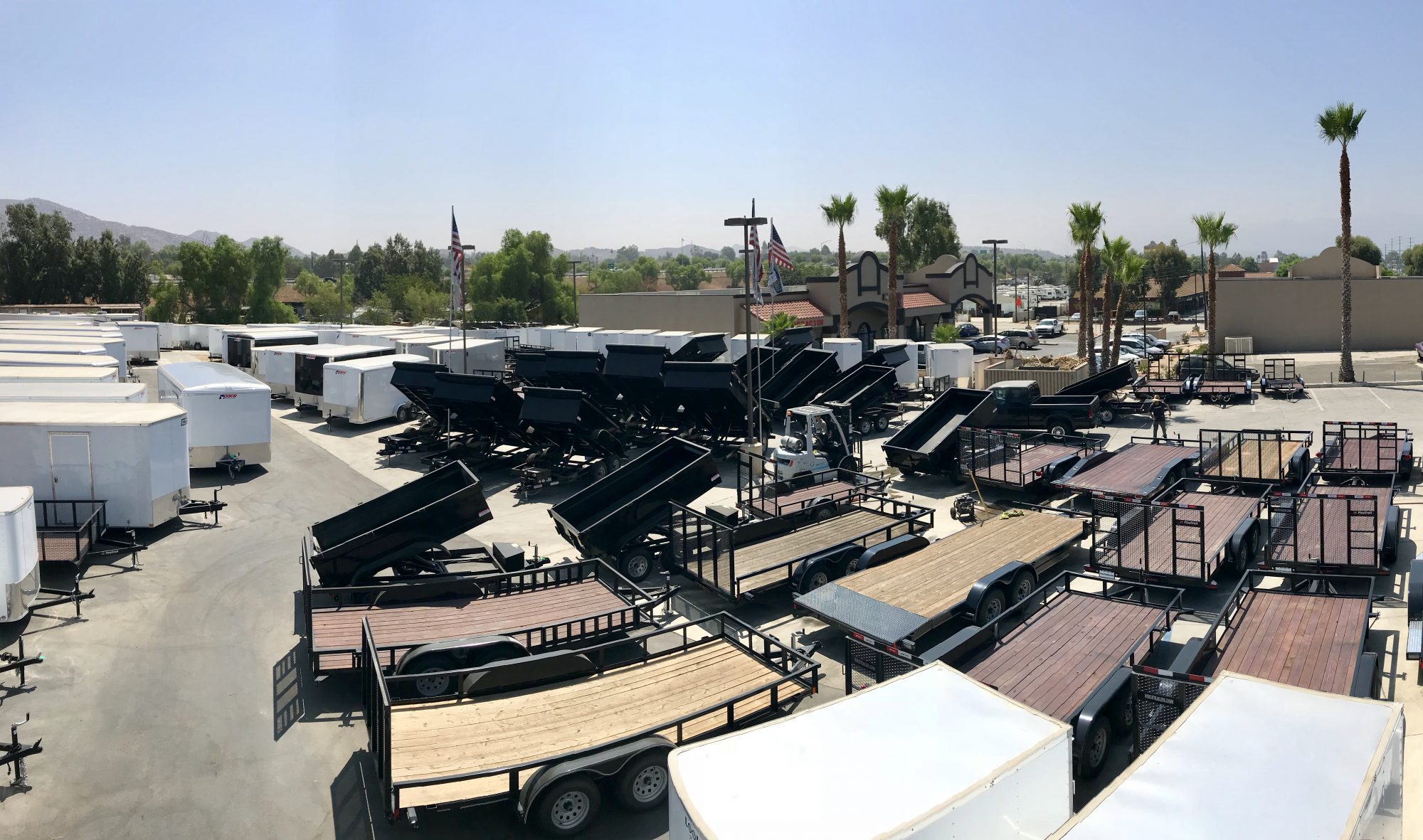
If you’ve started your trailer shopping recently you’ve likely come across abbreviations and phrases you’ve never heard before (GVWR, GAWR, Towing capacity, payload capacity, etc) which can be very confusing, so we’re here to take the definition confusion off your plate! Read on for our clarification of the definitions that will help you fully understand the most important factors to making the correct trailer purchase decision for your needs (Hint: they all have to do with weight) !
Towing Capacity
Towing Capacity is probably the easiest of these terms to understand. The car, truck, or SUV you’ll be pulling the trailer behind is called your Tow Vehicle. The tow vehicle will impose weight requirements on your trailer purchase decision because your tow vehicle’s towing capacity is the figure you’ll need to know in order to ensure you purchase a trailer with a GVWR under your vehicle’s maximum weight limit. The Towing Capacity is the Total Amount of weight your Vehicle can tow , and answers the question How much can my vehicle haul? Towing Capacity is not including any cab weight inside your vehicle: that’ll be defined by your vehicle’s GVWR sticker found on the sticker inside the driver’s door usually. Also important to know is the cab weight inside your vehicle doesn’t affect your towing capacity. You never want to risk overloading your tow vehicle by choosing the wrong axles on your trailer, so it’s necessary to determine your vehicle’s towing capacity before you fall in love with a trailer it won’t be able to haul!
Every vehicle manufacturer has a different towing capacity, and a vehicle’s maximum towing capacity can vary widely depending on the axle size, engine and transmission sizes, hitch rating, even the model or series can affect this figure with some brands! To make sure you buy the right trailer for your needs we recommend you Double Check your vehicle’s Owner’s Manual and use the Index to find the section on Towing to see your manufacturer’s guideline to your vehicle’s maximum towing capacity. If this option isn’t available, try calling a dealer of your vehicle and ask the towing capacity of your make, model, and year. Also available for those with newer vehicles: Camping World’s Towing Guide can help you determine the towing capacity of 2005-2018 vehicles if you Follow this Link .
Regardless, which state you’re purchasing your trailer in the GVWR on the sticker is the Legal, Maximum Weight Limit of the trailer. GVWR stands for Gross Vehicle Weight Rating , and essentially means the Total amount of weight the trailer can weigh while it’s on the road. Typically *, the stickered GVWR is determined by adding together the empty trailer’s weight +plus+ the total weight of the cargo it was built to handle (Payload capacity).
*Exceptions: Many states have CDL (Commercial Drivers License) requirements when the trailer’s GVWR is over 10,001 lbs; to avoid the CDL requirement you’ll find many trailers de-rated by the manufacturer to just under the CDL weight requirement (9990# or 9900# in CA), so anyone can haul the trailer. Similarly, you’ll find single axle trailers de-rated to 2990# because any trailer with a GVWR over 3000 pounds requires brakes in some states like CA. De-rating a trailer reduces both the legal payload capacity as well as the GVWR.
Payload Capacity
The Trailer’s Payload Capacity is the total weight of the cargo you can add to the trailer safely. Payload capacity is also sometimes referred to as your cargo capacity. The Payload Capacity is usually stickered on the trailer near the VIN#. It can be found by Subtracting the Empty Weight of the trailer from the stickered GVWR.
Helpful Hint: Never buy a trailer with a Larger GVWR than your vehicle’s Towing Capacity! Unless you know the Exact weight of your maximum cargo payload (not just a guesstimate), plus the empty weight of the trailer will never make the trailer’s GVWR close to the towing capacity of your vehicle. Be careful with this buying strategy if you’re unsure about cargo weights though, because when you have free space to fill (and available the payload capacity to haul it) in the trailer, it’s too easy to load it up and then overload and stress your tow vehicle!
Example: Let’s say the SUV/Truck can tow 5000 pounds, but you want a 7000# GVWR Trailer expecting to load 3500 lbs. into the trailer. If the trailer weighs 2500 pounds, your desired 3500# of cargo will overload your tow vehicle’s towing capacity by 1000 pounds (stressing out more than just your engine…even though the trailer would still be capable of handling the cargo weight). However, if you have the same 5000 pound towing capacity and you know you’ll only ever load 1500 lbs. into the trailer, and it’s the same 2500 pound trailer, you’ll be under your vehicle’s towing capacity by 1000 lbs which should not pose any issues at all.
A less common abbreviation you may have also come across in your trailer research is the GAWR (Gross Axle Weight Rating). GAWR is similar to GVWR but only represents the Maximum Axle Capacity of the trailer; not the legal weight rating for the road. A trailer may have tandem 6000# axles (12K total), but the GVWR sticker that determines the legal weight limit on the roads could either be rated at that max of 12,000# or it could be de-rated to 9990# (or a similar weight under 10K in CA) so anyone without a CDL can tow the trailer. If the GVWR is de-rated, the axles can still handle the 12K total weight, but you won’t be legal towing all that weight on the roads if your payload capacity exceeds your trailer’s stickered payload capacity resulting in you towing the trailer on the road while it weighs more than the stickered GVWR legally allows.
Example: Hypothetically, a dump trailer has two 7000# axles and weighs 4000 pounds empty. If the 14K GVWR gets de-rated to 9990# so anyone can haul this trailer on CA roads, the stickered payload capacity would only be 5990 lbs. Alternatively, if it’s stickered so a CDL is required to tow the trailer at 14K GVWR, it has a 9990 pound payload capacity.
Technically you can be ticketed and fined for any single pound you’re over your trailer’s GVWR! So make sure the payload capacity and GVWR stickered on the trailer match your Driver’s License and your Cargo’s Weight Needs to ensure you buy one trailer that’ll work for all your needs without causing more problems for you down the road.
Our Expert Advice: Knowing your maximum towing capacity and cargo weights before buying a trailer will save you time, money, and headaches down the road!
Do You Know How to Read a Trailer’s VIN Tag to Reveal the Information that Matters?
The Payload Capacity, GVWR, and GWVR are all clearly marked on the trailer’s VIN Tag; so is the manufacturer’s name, model and size, recommended tire pressure, and more if you know what you’re looking for and where to look.
Our experts reveal the secrets to reading the VIN Tags from some of our trailers currently in stock below. In order to fully demonstrate the lesson we’ve included standard as well as de-rated trailer tags so you’ll be able to understand how to decipher what you read on the next trailer tag you come across!
Important Note for anyone considering purchasing a used trailer from a private seller: be certain any trailer you look at has an authentic VIN tag! If it doesn’t have the VIN# clearly marked in several locations on the trailer (not just on the VIN sticker). Not so Fun Fact: Trailers are the Number One Stolen Vehicles here in California! Oftentimes thieves steal trailers, remove the VIN tags, and file off the stamped VIN#s on the trailer in order then try to trick you into buying it illegally! This is why our family would NEVER purchase a used trailer from a private party without first verifying they have a clear title for the trailer in hand. The title must be in the person selling its name, which should seem like common sense but you’ll be surprised how often we hear of someone with a story to explain why they’re trying to sell a trailer with a title that’s not in their name…Don’t be fooled there’s too many scammers out there you’ve got to protect your hard-earned money! If you are buying a used trailer the title must also have the VIN number of the trailer and it NEEDS to match the VIN sticker (the VIN Tag should not have any VOID marks visible on it; this happens when a sticker is removed) and VIN stamped on the tongue of the trailer (all of our brands do this extra measure but some may not). Just because it looks like an authentic title you can’t trust that title belongs to that trailer, verify the numbers match just in case before considering the purchase further.
Where is the VIN Tag?
The tag is typically located on the street-side of the trailer either on the side of the exterior, or on the A-frame tongue near the nose of the trailer. If you’re out trailer shopping and you don’t see a rectangular VIN sticker on the front framing or on the side of the trailer, Remember our experts wouldn’t risk it by purchasing that trailer!
The Trailer VIN Tag’s Important Info
- The Manufacturer’s name is the top line of standard trailer VIN Tags.
- Subtracting the Payload Capacity from the GVWR will tell you the trailer’s empty weight.
- Sometimes this will be exactly the same as the GVWR and sometimes the GVWR will be smaller because it’s been de-rated.
- R stands for Radial (rubber tire with steel threads), D stands for Bias ply tire (rubber tires)
- Some Brands put their model reference and size in the Bottom Right corner on the VIN Tag (some include both width and length others just include the length), as you can see from our examples from Innovative, Look Trailers, and Playcraft Trailers. Featherlite Trailers mixes things up a bit by adding the model and size in the Top Right corner instead.
- The Payload Capacity sticker is another Crucial sticker you need to make sure is on your trailer. Because the Payload Capacity is one of the Most Important numbers you’ll need to know! Usually this sticker is positioned next to the VIN Tag; you shouldn’t have to search hard to find it once you’ve spotted the VIN tag.
- The VIN # reveals the trailer’s model year: 2017 year trailers will have an H in the last 8 digits, 2018 year trailers have a J, and 2019 trailers are already out with the letter K initiating the last 8 digits of the VIN#s. You can continue this trend to easily reveal the model year of older units as well.
Because this single axle 4×6′ trailer was de-rated the GVWR is 510 less than the GAWR, which means the payload capacity is also 510 pounds less than this trailer would’ve had if it had brakes equipped from the manufacturer originally.
Playcraft Trailers are owned and manufactured under the name Sun Country Trailers in Arizona. Stock#4310 was ordered with drive-over fenders making it have a 102″ drive-able width , however, it was built on the 82″ wide model so will have 82″ between the fenders.
When dump trailers are de-rated like the one above, the legal payload capacity can vary by as little as 500 pounds all the up to 5000 lbs difference from the payload when stickered at the full Axle Rating. If you know you’ll need to haul A LOT of weight (over the 10K GVWR) then you should look into getting a CDL to ensure you don’t rack up Thousand$ of dollars in fines for being overweight hauling a de-rated trailer!

This top of the line Shadow GT Race trailer weighs considerably more than the same size trailer in an entry-level model because of it’s all 16″ on center tube framing, torsion suspension, .040 aluminum exterior, and lots more features we’ve upgraded it with! Check out the Shadow Race trailer we have in stock now

Featherlite Trailers are built with the highest quality aluminum alloys that are as strong as steel and used to build airplanes. Because aluminum is substantially lighter than steel, these trailers offer More Payload Capacity on the same axle platform (2-3500# axles). Aluminum is also rust and corrosion resistant so Featherlite Trailers last forever without the fear of rust creep eating away at your trailer. The quality packed standard features on Featherlite Trailers are decisions that so cost more up front but will provide decades of dependability; and if you ever do experience any issues Featherlite Trailers are backed by the industry’s longest warranty on trailers: 3 year bumper to bumper warranty with a full 10 year warranty backing up the trailer’s structure and materials! Click Here to Check out the Featherlite Trailers in stock in So Cal at Norco Trailers.

Ready to find the trailer you need that’ll work to tow behind your vehicle? Visit our Online Inventory Here to View Pictures and Prices of ALL 500+ Currently Available Trailers at Norco Trailers in SoCal.
© 2024 New and Used Cargo, Utility, Car, & Horse Trailers For Sale – Norco Trailers
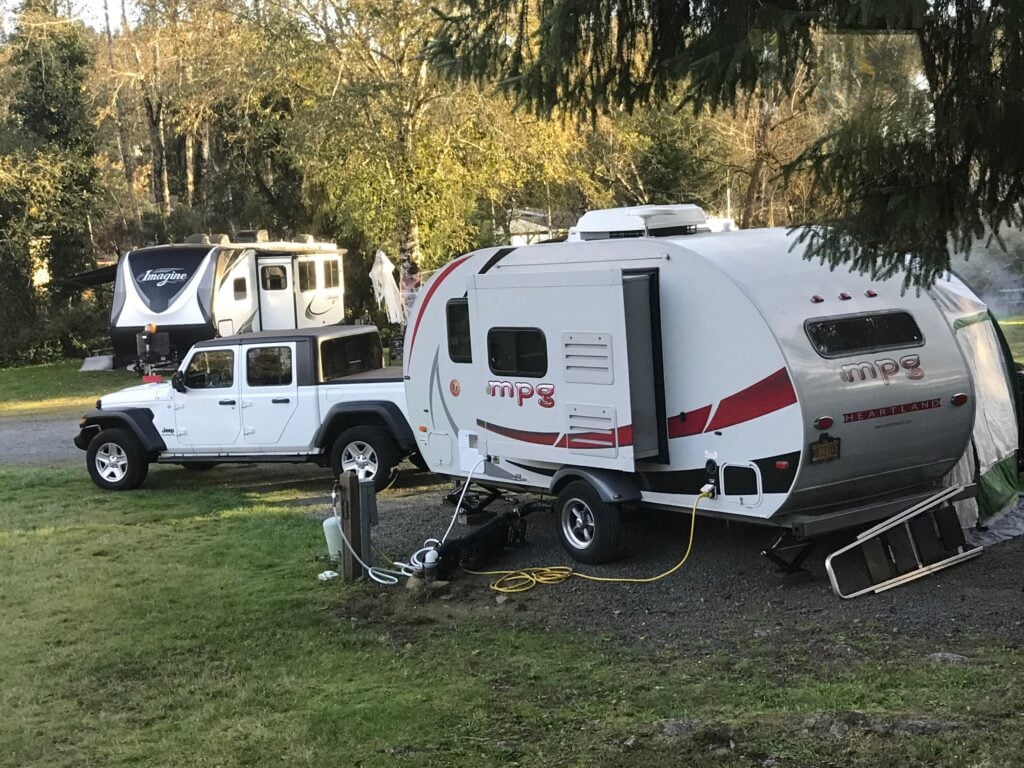
This post may contain affiliate links or mention our own products, please check out our disclosure policy
What Is Your Gross Vehicle Weight (And Why Does It Matter)?
- November 7, 2020
- 13 Comments
Table of Contents
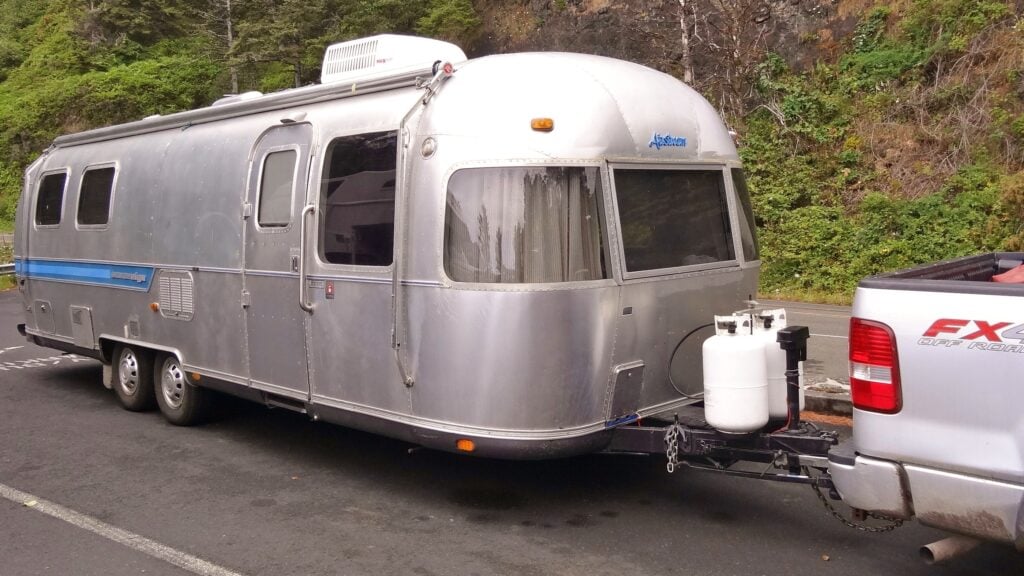
Better RVing Begins with Understanding Gross Vehicle Weight
The gross vehicle weight of your RV matters. How much? In some cases, it is a matter of life or death. But it’s not all that complicated when you take a few minutes to consider all the variables. Start by breaking down the important components of the gross vehicle weight formula.
There are dozens of resources on the internet that go into great depth about this subject. Some have formulas you can use for your own calculations. There are even formulas used by dealers to help you determine which RVs in their inventory your particular towing vehicle can safely tow.
There’s no point in rewriting what has already been covered in such detail. This article examines a few real-life RVers’ practical applications of the vehicle weight issue. Learn how this RV gross vehicle weight applies to your RV, your tow vehicle, your toad, and your particular camping lifestyle.
What is RV gross vehicle weight?
Before we look at unique examples of gross vehicle weight, you need to understand that there are basically two main considerations.
The first is that every RV has a specific gross vehicle weight rating (GVWR) that it can safely manage over the long haul. That weight is comprised of the actual manufactured weight of the vehicle. It also includes (and this is where it becomes an issue of lifestyle choices) all the rest of the weight that you add to your RV.
That added weight is usually referred to as the cargo carrying capacity (CCC). In RVs manufactured before 2000, that added weight was referred to as net carrying capacity (NCC). Either way, it refers to everything extra you add to your RV.
What RV cargo are you carrying?
The cargo-carrying capacity includes the weight of all fluids such as gas, propane, water, and the content of your holding tanks. It also includes you and your furry friends. And also, all your food, gear, supplies, tools, clothes, and extra stuff stored in your basements.
These extras can add up quickly and with some RVs, the cargo capacity may be very limited, so you need to pay close attention to all the extras you put into your RV, like your tarps and tents, easy-ups, barbecue, fishing, hunting, hiking, and boating gear, and in our case, dog food.
We travel with 4 dogs weighing between 30 and 40 pounds. Their combined weight is equal to another human being. The real concern is the weight of their dog food. They consume 10 pounds of dehydrated dog food every week. This particular food is difficult to find in most of the places where we travel. We often have over 200 pounds of dog food in our RV. That weight all needs to be accounted for in our total allowable cargo carrying capacity.
For your reference, a gallon of milk, or propane, or gasoline, or water, weights about 8 pounds. If your RV has a 50-gallon water tank, a 20-gallon propane tank, and your gas tank hold 70 gallons of gasoline, those full tanks add up to 1,120 pounds of weight that also needs to be accounted for in your total carrying capacity calculation.
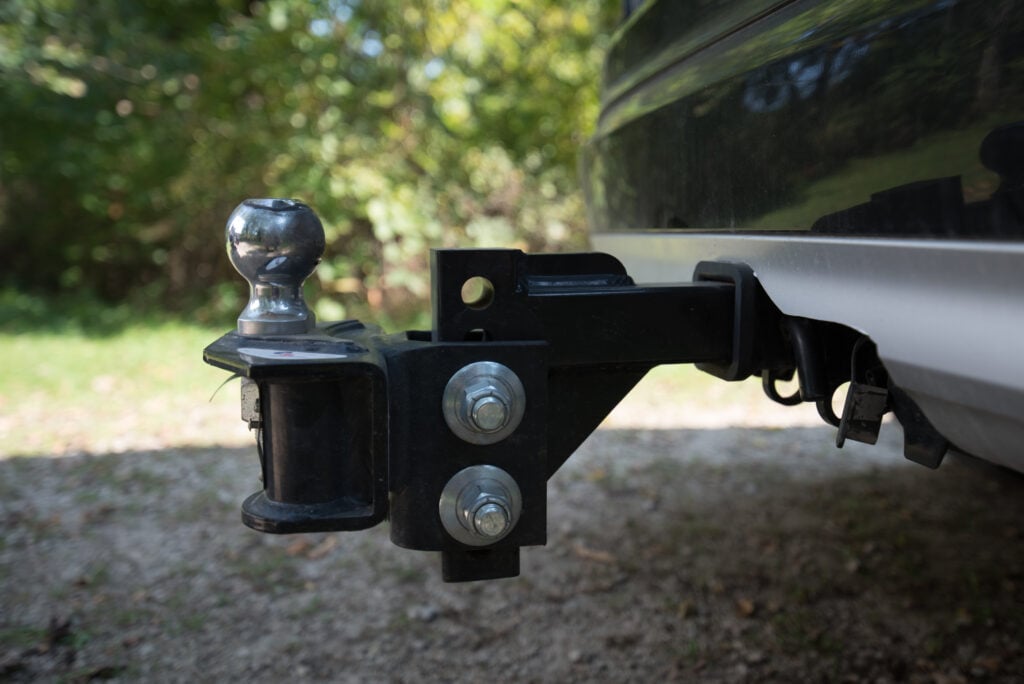
A weight distribution and sway control trailer hitch and ball for RVs and trailer towing. Photo via Wikipedia Creative Commons Tony Webster from Minneapolis, Minnesota, United States , CC BY 2.0 , via Wikimedia Commons
How tongue, hitch and pin weight impacts your RV
Additionally, you need to consider how towing impacts gross vehicle weight. When you are towing your RV or towing a vehicle behind your RV, both vehicles have maximum weight limits and they directly affect each other when the two vehicles are connected to each other.
Your RV weight limit may be fine, but you could exceed the weight limits of your towing vehicle. The result create unsafe driving conditions. For example, if you’re towing a 40-foot fifth wheel toy hauler behind a diesel pick-up truck, some of the weight of the fifth wheel is transferred through the pin weight to the truck, and depending on what the gross vehicle weight of the trailer is, and how that weight is distributed, it could put extra strain on the truck and make it unsafe to drive.
Additionally, if you’re towing a travel trailer behind an SUV, some of the weight of the trailer is transferred through the tongue or hitch and adds to the gross vehicle weight of the SUV. And in that same vein, if you’re towing a toad behind a motorhome , the weight of the towed vehicle is transferred to the motorhome through the hitch weight.
What about towing motorcycles behind RVs?
If the toad is on a dolly, some of the weight of the dolly and the toad are both transferred to the motorhome through the hitch and must be included in the overall cargo carrying capacity for the motorhome. Want to add a motorcycle rack to the back of your RV? The weight of the rack and motorcycle must be included too.
A fully dressed Harley can weigh more than 1000 pounds. The motorcycle rack could add several hundred pounds of extra weight. Together, they can lower the amount of available carrying capacity you have in your RV.
These are all lifestyle choices. If you want to mount your Harley on a motorcycle rack, you may not have much carrying capacity leftover for other gear. It might be a trade-off you’re willing to make. Or, you might need to shop for an RV that allows for more carrying capacity.
Calculating RV weight distribution
The weight distribution needs to be part of your carrying capacity calculation. I mentioned above that the way the 40-foot toy hauler was loaded could impact the pin weight of the pick-up truck’s total weight.
If you put all the extra weight in the back of the toy hauler behind the trailer’s wheels, it tends to lift the front end of the trailer. This lowers the pin weight. To some extent, this can be good. But lifting too much weight can cause RV trailer sway. Using this method to control the pin weight is not a safe option.
Both vehicles need to be within their allowable gross vehicle weight limits and properly balanced to each other. You may need to take a trip to a scale and unhook your trailer to accurately measure the weight of both vehicles separately and then in combination.
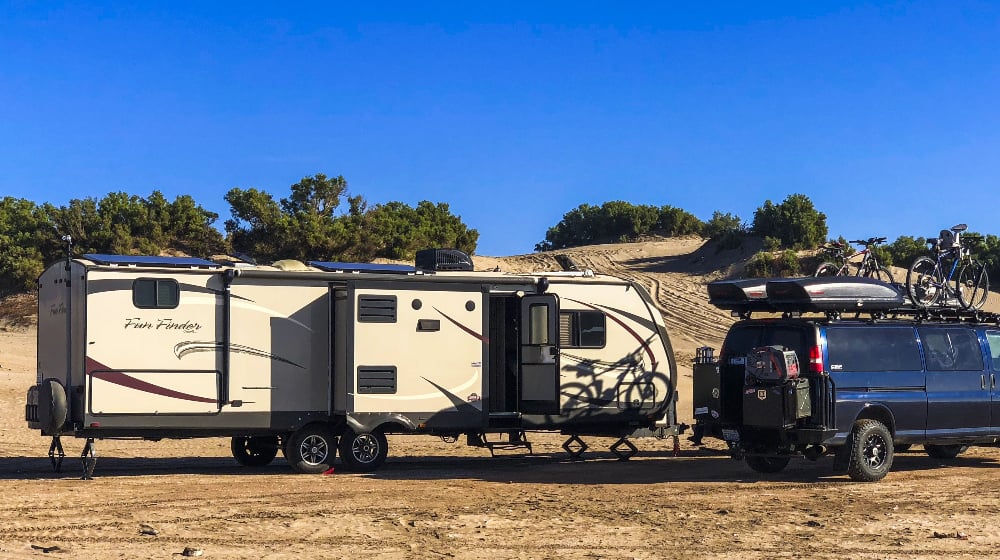
Towing and towed RV combinations are endless.
Be sure to consider your RV’s towing limitations, so you chose the right fit for your lifestyle. Plan to carry a lot of extra gear in or attached to your RV? You may need to spend more on your towing vehicle. We have friends who tow a 45-foot fifth wheel. They have a commercial diesel truck modified for RV towing.
Another couple we know intentionally purchased a large Class A diesel motorhome. Their lifestyle involves traveling around the country competing in car races. They tow a heavy trailer in which they keep the race car, parts, tools, and other gear. They don’t want to drive a stock car around town. So they built a platform in the trailer for a second vehicle.
Consequently, they tow a huge trailer behind their motorhome with two cars stacked in the trailer. The total weight distribution of the trailer must be managed carefully. Even with a large diesel motorhome as the towing vehicle, excessive weight is dangerous.
Don’t overload an RV then try to compensate with distribution
All vehicle manufacturers assume theirnvehicle will have an even weight distribution from side to side and from front to back. But that may not always be the case. The axles each have a maximum weight limit. Again that is based on the assumption of an even weight distribution from one wheel to the other.
If your RV has 3 large slides on one side and one on the other side, there may be an inherent weight mismatch in the way the rig is set up. Then you might unwittingly compound that problem with the way you distribute your gear in the RV.
If you think your rig is not well balanced from side to side, you may need to drive your rig over the scales. Measure one wheel at a time or have your rig’s weight evaluated by professionals.
Learn more about RV towing safety
Understanding all these issues can help you decide if you will need a half-ton truck or a one-ton truck to haul your RV. The gross weight of your rig is the actual manufacturer’s weight plus you, all your gear, and its attachment to another vehicle. You need to understand what your rig’s weight limits are, how much weight capacity you have for all the extras, and if your lifestyle fits within those limits, because operating your RV outside of those parameters is not safe or prudent.
Enjoy your RV and drive safely. For more information, check out the following short video by Michael Hall explaining RV weight issues:
Resources and Where to Weigh Your RV
Escapees RV Membership program makes SmartWeigh services available to their club members. For a small fee, you can make an appointment at one of their scales to have your towing (or towed) vehicle, as well as, your RV evaluated for total weight, distribution, and safety
Also check out these great resources for more information:
- RV Towing: Important Things To Consider
- This Trailer Tongue Weight Scale Could Save Your Life
- Watch This Out-Of-Control Trailer Flip And Crash On The Highway
- How To Avoid The Dangers Of An Overweight Trailer
You May Also Like:

Overweight RVs are a Bad Idea: Here’s What to Do About It
Overweight RVs put your safety and accident liability at risk. Reduce your accident by understanding the importance of weight and tow vehicle limits..

RV Storage Space: How Important Is It?
RV storage space is more important than you might think! It can directly impact how much you enjoy your camping experiences.
13 thoughts on “ What Is Your Gross Vehicle Weight (And Why Does It Matter)? ”
1 gallon of propane weighs 4.4 pounds, not 8 pounds mentioned in the article.
“For your reference, a gallon of milk, or propane, or gasoline, or water, weights about 8 pounds.”
It’s good to explain the density of liquids, but no – all liquids are not the same density. Anything that’s almost all water (including milk or wastewater) weighs the same roughly 8 pounds per US gallon, but gasoline is about 6 pounds per US gallon, and propane is only 4.1 pounds per US gallon.
“… if you’re towing a toad behind a motorhome, the weight of the towed vehicle is transferred to the motorhome through the hitch weight.”
Not if the toad is on its own wheels – then the tow bar doesn’t carry any of the toad’s weight, so it adds nothing (other than half the tow bar’s weight) to the motorhome’s gross weight.
Greetings all This is an awesome article, but is there a way to break down this article into vehicles that tow a fifth wheel, class A motorhome (with and without a tag axle), Class B motorhome, and Class C motorhome?
I am really disappointed in Peggy Dent and RVLife editors. She begins with the “fact” that milk, gas (and diesel), propane and water all weigh 8 pounds. I cannot read further because if these “facts” are incorrect, what else is wrong in the article. A two minute check will reveal that a gallon of milk weights 8.6 pounds, a gallon of water is 8.4 pounds, a gallon of diesel weights 7 pounds, gasoline weighs 6 pounds and, the complete misrepresentation — propane weighs 4.2 pounds (one half the weight of water). Please, Peggy and editor, do your job before you mislead your readers.
A propane tank is measured in LBs not gallons. A 20# tank holds 4.7 gallons weighing 4.2lbs each. A 20# tank holds 20 lbs and weighs 37 lbs full. (17lbs for the tank empty). Gasoline weighs 6lbs per gallon. Diesel 7lbs. I read an article about a guy who weighed EVERYTHING he put into or took out of his RV. Weighed groceries when returning from the store, garbage going out. A little excessive but then it doesn’t take long for it to add up to more than you should carry.
I want information on towing.
Peggy thanks for providing these articles on safety. If it helps one RV owner better understand the safe operation and limits of their rig it makes the roads safer for everyone. Unfortunately I see little in the way of enforcement regarding RVs and even less knowledge of many new owners.
Many Travel Trailer manufacturers (KZ for example) include passengers in their GVWR, even while the vehicle is parked for overnight camping. Therefore if you have a cargo capacity of 1000 pounds, it may seem a lot, however if you are sleeping 4 persons, have propane, battries and gear in the Trailer, you will be overweight (over the GVWR) every stop when the occupants enter the Trailer.
- Pingback: Big RV Mistakes I Made With My Trailer This Year - Camper Report
Can you exceed the GVWR when your travel trailer is parked and stabilized? Is the gvwr only applied when the trailer is on the road.
GVWR is a limit and applies the load on a moving vehicle. It is relevant to a stationary vehicle to the extent that at some point, the vehicle will likely move with whatever load is connected/applied. Relative to a trailer, GVWR needs to account for the tongue weight the trailer applies. GVWR is a reflection of what the vehicle was designed to carry (not pull) that factors in tire capacity, wheel capacity, axle capacity, and suspension capacity. While you can’t actually change the GVWR of record, because that is set by the way the manufacturer sold the vehicle, you can improve your vehicle’s ability to carry weight by improving the weakest link in those 4 items. What is not addressed in the article is the GCWR or the gross combined weight rating of the vehicle and tow together. GCWR addresses the ability of the vehicle to steer and brake a towed load.
- Pingback: Travel Trailer Beginners Camping Guide - Camper Report
Leave a Reply Cancel reply
Your email address will not be published. Required fields are marked *
Save my name, email, and website in this browser for the next time I comment.
Welcome! Please follow these guidelines:
- Be kind and respectful.
- Keep comments relevant to the article.
- Avoid insults, threats, profanity, and offensive remarks.
- Refrain from discussing gun rights, politics, or religion.
- Do not post misleading information, personal details, or spam.
We may hide or remove comments at our discretion.
I have read and accepted the Comment Guidelines and Privacy Policy *
Recent Posts

Browse By Category

Accurate Trailer Ratings Are Based On What? Understanding GVWR and Other Crucial Metrics
Feb 19, 2024 | TRAILERS

Have you ever wanted to buy a trailer, but you have no idea where to start? Trailer Ratings are based on what? Keep reading!
Whether you’re a seasoned RV enthusiast, a boat trailer owner, or are venturing into the world of hauling cargo, understanding trailer ratings is essential. It’s not just a matter of hitching your trailer and hitting the road; you need to be aware of your vehicle or boat’s weight limitations, how to match the right trailer to your needs, and – above all – ensure safety and compliance with the law.
Trailers, from utility rigs to boat trailers, to the luxurious campers seen traversing the countryside, are evaluated by several critical metrics that define their capabilities.
Let’s take a deep dive into these ratings and uncover their significance. Understanding gross vehicle weight ratings (GVWR), gross axle weight ratings (GAWR), tongue weight, and other specifications means making smarter choices and staying safe on the road.
Get A Quote!
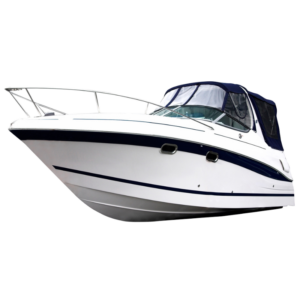
Trailer Ratings Are Based on What? The Three Pillars of Trailer Ratings
To understand how your trailer is rated, you should know that it’s like a three-legged stool—GVWR, GAWR, and tongue weight each represent a leg.
1. Gross Vehicle Weight Rating (GVWR)
The Gross Vehicle Weight Rating (GVWR) is the absolute maximum that your fully-loaded trailer can weigh. It takes into account not only the trailer’s dry weight but also the weight of your cargo, passengers, and any fluids you may carry. It’s the big number that can’t be ignored. If you do, you risk damaging your suspension, tires, or the frame of the trailer.
2. Gross Axle Weight Rating (GAWR)
Gross Axle Weight Rating (GAWR) is more specific, focusing on the load that each axle can handle. It’s important to distribute your cargo evenly to ensure that no axle bears a disproportionate amount of weight. An imbalance could lead to swaying or even a catastrophic failure of one of your axles.
3. Tongue Weight – The Weight on Your Hitch
Tongue weight is the downward force your trailer’s tongue exerts on your hitch ball. This not only affects your vehicle’s handling but also its braking efficiency. A good rule of thumb is to keep tongue weight between 9-15% of your trailer’s total weight, for stability and control.

Trailer Ratings Are Based on What? The Legal Aspect
The Department of Transportation (DOT) sets strict regulations governing trailers and their load limitations. Beyond manufacturers’ ratings, there are state laws that can impose further restrictions based on the type of trailer, the vehicle you’re towing with, and the roads you’ll be traveling on. Ignorance isn’t a defense,
and violating these regulations can lead to fines, insurance issues, and penalties for overloading vehicles that can lead to damage or, worse, accidents.
It’s vital to know the limits set by the DOT and your state, and also the penalties you could face for exceeding them. Check your owner’s manual, and don’t hesitate to get in touch with the DOT or your state’s transportation department for clarification if necessary.

Trailer Ratings Are Based On What? How to Apply Ratings to Your Trailer Weight
Understanding what the numbers mean is one thing; applying them to your trailer is another. Here’s a breakdown of how to utilize trailer ratings practically.
Weigh Your Trailer Regularly
Knowing your trailer’s actual total weight is crucial. You might be surprised how quickly you can hit a trailer’s maximum weight with a few extra items. Regularly weigh your trailer to ensure you’re within the GVWR.
Ensure Proper Tongue Weight with a Scale
Tongue weight should be measured and adjusted with a tongue weight scale. It’s not enough to guess or rely on the manufacturer’s specifications.
Distribute Your Load Evenly
As discussed earlier, even weight distribution is essential for safe towing. Use appropriate tools like load-leveling hitches and sway control devices to distribute your cargo evenly across all axles.

Interstate Haulers always makes sure we know the laws and regulations of trailer ratings, so we can tow your boats, RV’s, and so much more!
Trailer Ratings Are Based On What? How the Tow Vehicle Affects Trailer Ratings
The plot of you and your family hitting the open road in that shiny, new RV trailer imagined in your backyard is a quintessential American road trip. But the narrative’s climax—a carefree adventure devoid of any towing troubles—rests considerably on an often overlooked character: your vehicle’s towing capacity. Failing to understand how your automobile meshes with your trailer can lead to a string of issues from vehicle damage to road safety concerns. Let’s hook up to the critical insights on how your tow vehicle directly changes the stakes in your trailer towing equation.
Understanding the Tow Rating Dynamic
The tow rating, or the maximum weight a vehicle can haul, is not fixed; it’s an intricate interplay of your vehicle’s properties and the trailer’s design.
Weight Capacity: Beyond the Numerical Myth
Lurking beneath this numerical limit is a complex web of factors—engine power, transmission strength, trailer coupler, trailer’s frame rigidity, and more. Exceeding these limitations doesn’t just strain the vehicle; it strains the relationship between the vehicle and the trailer’s design intent, often with expensive and occasionally dangerous consequences.
Power to Pull: The Might of Your Drive Train
It’s not just the muscles but also how they flex. Upgrading to a higher tow rating means more horsepower, torque, and potentially a stronger transmission . A well-equipped tow vehicle doesn’t just move weight; it maneuvers it confidently, especially on inclines and under heavy loads.
Systems in Sync: Brakes and Suspension
For your vehicle to be an effective pulling partner, its brakes, transmission, and stability control systems must be in optimal condition. They need to be able to manage the additional load, ensure safe stopping distances, and maintain control, especially during emergency maneuvers.
Towing Compliance: A Legal Obligation
Did you check your tow package? Is your load secure? The compliance conundrum leads to a patchwork of regulations that, when combined, create a legal landscape that’s often as varied as the scenery of your cross-country adventure. Avoiding the fines and legal quagmires means understanding the regulations and configurations you must adhere to.
Stability and Safety: The Ultimate Hitch in Towing
The hitch isn’t just a point of connection; it’s about making sure that connection is reliable. Weight distribution hitches and trailer sway control systems are your allies, ensuring that your tow package operates in harmony for a smooth and stable journey.
The Pursuit of the Perfect Tow Vehicle
From the bull bar to the tail hitch, every vehicle is built with a purpose. Selecting the right one can make or break your towing experience.
Trailer Ratings Are Based on What? Specification Matching
Demystifying the ‘specs game’ is all about finding harmony between your vehicle’s listed capabilities and the trailers you aspire to pull. It’s an exercise in precision where every pound matters and every inch of torque can be the difference between effortlessly cruising and white-knuckling turns.

Trailer Ratings are Based on What? Maintenance and Upgrades
Regular vehicle maintenance is the bedrock of a successful towing operation. It keeps all the systems and components at optimal functioning levels, especially when they are tasked with hauling a significant load.

Trailer Ratings Are Based On What? 6 FAQs About Trailer Ratings for Hauling Trailers
Navigating the world of trailer hauling can be overwhelming, especially when it comes to understanding the various ratings that dictate how much your trailer can safely carry. Whether you’re a seasoned pro or a greenhorn to the open road, knowing the ins and outs of trailer ratings is crucial for a safe and efficient journey. Here are the top six frequently asked questions about trailer ratings , demystified for your convenience.
1. Is It Safe to Max Out The Maximum Trailer Weight?
It’s never safe to push your trailer’s weight limits to their extreme and apply too much weight. These ratings are set by manufacturers after extensive testing to ensure safe handling and structural integrity. Operating above these limits dramatically increases the risk of accidents due to compromised braking systems, quicker tire wear, and a higher chance of swaying.
2. Can I Increase My Trailer’s GVWR or GAWR?
Unlike a vehicle’s power, which you can increase with modifications, you cannot raise a trailer’s GVWR or GAWR without fundamentally changing its structure. Even if you were able to modify it, doing so would void warranties and potentially make your trailer illegal for road use.
3. What Are Tongue Weight and Payload Capacity, and Why Do They Matter?
Tongue weight is the downward force the trailer tongue puts on the hitch ball, usually 10-15% of the total trailer weight. Pay load carrying capacity is the maximum weight a trailer can carry. Safe tongue weight and payload distribution ensure proper handling and performance, preventing accidents and reducing wear on vehicle components.
4. How Do I Calculate Trailer Tongue Weight?
The simplest way to calculate tongue weight is to use a dedicated scale that measures the weight placed on the hitch, but for an approximate value, take 10-15% of the trailer’s loaded weight. Distribute cargo in the trailer to achieve the desired tongue weight, typically around 60 lbs for every 500 lbs.
5. What Can Happen If I Don’t Pay Attention to My Trailer’s Weight Ratings?
Neglecting your trailer’s weight ratings can lead to numerous problems, including but not limited to:
Vehicle instability and swaying, especially at high speeds or in windy conditions
Overheating of vehicle components due to excess strain on the engine and transmission
Reduced vehicle and trailer control, making it harder to stop or maneuver
Premature wear on vehicle tires, brakes, and suspension
6. Can a Towing Vehicle With a Higher Gross Combined Weight Rating Tow Any Trailer?
Not necessarily. While a vehicle with a higher tow capacity can technically pull heavier trailers, other factors such as payload capacity, hitch type, and state regulations also come into play. Always ensure every element of your towing configuration is compatible with one another and adheres to local towing laws.
As you embark on your hauling adventures, remember that safety should always be your top priority. Understanding your trailers’ weight ratings isn’t just about following the law; it’s about ensuring you, your cargo, and everyone else on the road can arrive safely at their destination.

Conclusion: Trailer Ratings Are Based on What?
By understanding trailer ratings, you can make informed decisions about what trailer to purchase and how to safely operate it. Keep in mind that these ratings are not just guidelines; they are essential for your safety and the well-being of others on the road. So before you hit the open road with your newly hitched trailer, make sure you have a firm grasp on its GVWR.
Looking for something specific?
You May Also Like

Discover the Magic of Malibu Boats and Elevate Your Watersport Experience
Jun 18, 2024 | Partners , BOATS
Imagine slicing through the water on a sleek, powerful boat, feeling the wind in your hair and the thrill of the open sea. That’s the essence of Malibu Boats. Founded in 1982, Malibu Boats has revolutionized the boating industry with its innovative designs and...

Conquer the Great Outdoors with Tracker Off Road Vehicles
Jun 12, 2024 | Partners
Outdoor enthusiasts, are you ready to elevate your adventures? Whether you're exploring rugged trails, hunting in dense forests, or working on a farm, Tracker Off Road vehicles are designed to meet your needs and exceed your expectations. This blog post will take you...

Paddle into Adventure with an Ascend Kayak
Jun 11, 2024 | Partners
Imagine gliding across serene waters, surrounded by nature, with the sun shining down and the gentle sound of your paddle slicing through the water. This isn't just a dream—it's a reality with an Ascend Kayak. For those who love the great outdoors, these kayaks offer...
Privacy Policy

What Does Dry Weight Mean on a Camper? (GVWR, UVW & Tow Capacity)
There are various weight measurements and towing capacities relevant for campers and trailers.
It’s beneficial for truck owners to understand what the dry weight means on a camper.
However, it’s just one of several useful weights and metrics that are relevant for truck owners, and people in the market for a new or used camper or trailer.
Towing safely is essential to avoid potential accidents caused by exceeding defined limits from the manufacturers.
We aim to provide useful information for people wishing to own an RV towable and pull it with their truck or another vehicle.
What is Dry Weight on a Camper?
What does uvw mean on a camper, gross vehicle weight (gvw) vs. gross trailer weight (gtw), what does gvwr stand for, what does gvwr mean on a travel trailer, dry weight vs gross weight camper, what does gawr mean, why is gvwr less than gawr, trailer weight vs towing capacity, camper tire and trailer tire max loads, closing thoughts, related articles.
The dry weight of a camper is the complete weight of the vehicle when it’s empty.
Essentially, it’s the weight of the camper when it’s just left the factory. That’s with no additional items added.
It includes no H2O loaded into the fresh water tank, no gray tank usage, no waste sitting in the black tank, and no extra personal items either.
Indeed, the dry weight for another towable like a travel trailer relates to the same thing too.
When owning a tow vehicle and wanting to avoid exceeding its towing capacity, knowing the dry weight of the camper model is somewhat relevant information.
Another piece of terminology for RVs is the UVW. The UVW meaning is an abbreviation for Unloaded Vehicle Weight .
To answer the question of “ What is UVW weight? ” requires a few weight-related calculations.
This should start with the camper’s unloaded weight, but include all the necessary engine lubricants and a filled-up fuel tank.
Also, propane to power internal equipment, such as a cooker, heater, refrigerator, or other pre-fitted appliances, too.
See Also: How to Keep RV Fridge Cold While Driving?
The UVW excludes after-market accessories, dealer-fitted extras, water, other supplies, and driver and any occupants too.
Furthermore, when the dealer has installed extras after the manufacturer, then it’ll be necessary to learn the total weight of the extras and add them to the UVW to use a more accurate figure.
The Gross Vehicle Weight (GVW) is a far more important metric.
A camper’s GVW relates to when it’s been loaded up with a realistic amount of gear.
It would include the items that you’d expect to be added or installed inside your camper.
For trailers, this is also sometimes referred to as the Gross Trailer Weight aka the GTW. But don’t get confused about the different terminology for trailers, because it’s the same as the GVW for campers.
By comparison, the dry weight is the weight of the camper or trailer when nothing was added beyond the default, manufacturer’s fit-out on a standard towable model.
Read Also: How to Get Rid of Mildew in My Camper
What Does GVWR Mean on a Camper?
With towable manufacturers, not only do they confirm the dry weight and gross vehicle weight, but they also provide other information too.
The GVWR stands for Gross Vehicle Weight Rating .
The GVWR is the maximum that the camper can carry. It is not saying what it’s likely to weigh with extras added by the owner or the dealer.
The manufacturer’s GVWR confirms for the travel trailer or camper owner how much their trailer or camper may weigh before potentially risking the structural integrity.
As a point of reference, this is similar to how bridges have a maximum capacity and can be thought of in this way too. Never exceed the GVWR for your trailer or camper.
The dry weight of the camper is what it weighs without any additional installations, water, propane, or other items beyond how it came out of the factory. It’s functional but it’s in factory condition from the weight standpoint.
The gross weight camper is how much the camper weighs when gear has been added to suit its purpose.
That might mean clothes, footwear, foldable camping chairs, and more.
It’s essentially an estimate with the difference between the dry weight and gross camper weight being what’s additionally added.
Read Also: How to Heat a Camper Without Electricity
The supporting axle has a rating for the amount of distributed weight it can handle.
With campers and trailers, this is referred to as the Gross Axle Weight Rating (GAWR). This denotes the maximum weight for both the front (FR) and rear (RR) axle limits.
This rating is usually different from the Gross Vehicle Weight Rating (GVWR).

An important distinction must be made between the weight that a towable front or rear axle can support and that of the camper or trailer itself.
The GVWR may be lower than the GAWR.
Why is this?
Because the weight bearing down on an axle could exceed the GAWR limits, however, it may still not yet exceed the Gross Vehicle Weight Rating.
This information could be material to both the towing vehicle and/or the camper or trailer being towed.
The gross trailer weight is a measurement confirming what it weighs when loaded up. It’s usually an estimate from the manufacturer and will differ from reality.
The towing capacity of a truck is the limit of what it can tow safely. This is provided by the manufacturer and shouldn’t be exceeded.
For instance, a Ford F-150 truck has a lower towing capacity than a Ford F-250 or F-350 truck.
Indeed, different models, engine sizes, and specifications alter the towing capacity with the F-150 range of truck models too.
When considering towing capacities to pull a camper or trailer , work both with the manufacturer’s confirmed towing capacity for the tow vehicle and the GVWR for the camper or trailer.
The Gross Vehicle Weight (GVW) may also provide some useful comparison too.
Always allow spare capacity between the towing limits of a truck and the estimated total fully loaded, spec’d out weight of a camper or trailer.
Often, the weights are off. It’s easy to unknowingly exceed the maximum towing capacity.
Always allow a considerable margin of safety . Exceeding towing capacities can cause serious road accidents. Be forewarned!
The tires fitted to the camper or trailer will have their single and dual maximum load stated on the sidewall of the tire.
Consult your camper or trailer manual for proper guidance on recommended tire inflation levels, carrying capacities, and more.
Ensure that your tires aren’t the weakest link in the weight-carrying chain.
While the dry weight is a good starting point, the Gross Vehicle Weight Rating (GVWR) is a more useful metric.
Knowing the maximum towing capacity of your tow vehicle to ensure it doesn’t exceed the GVWR is the safest option.
Then you’ll want to weigh the camper or trailer once it’s fully loaded to ensure it doesn’t exceed its GVWR or put too much weight on the front or rear axles either.
Lastly, check the tire capacities too. Ensure they’re not exceeded and are inflated with the correct PSI relative to the weight being supported.
- How to Get Rid of Mildew in My Camper
- How to Heat a Camper Without Electricity
- How to Keep RV Fridge Cold While Driving?
- How Long Do Camper Tires Last?

JavaScript seems to be disabled in your browser. For the best experience on our site, be sure to turn on Javascript in your browser.
- My Purchase Orders
- Compare Products

- Understanding Towing
- Towing Capacity Guide - Chapter 4
Towing Capacity Guide
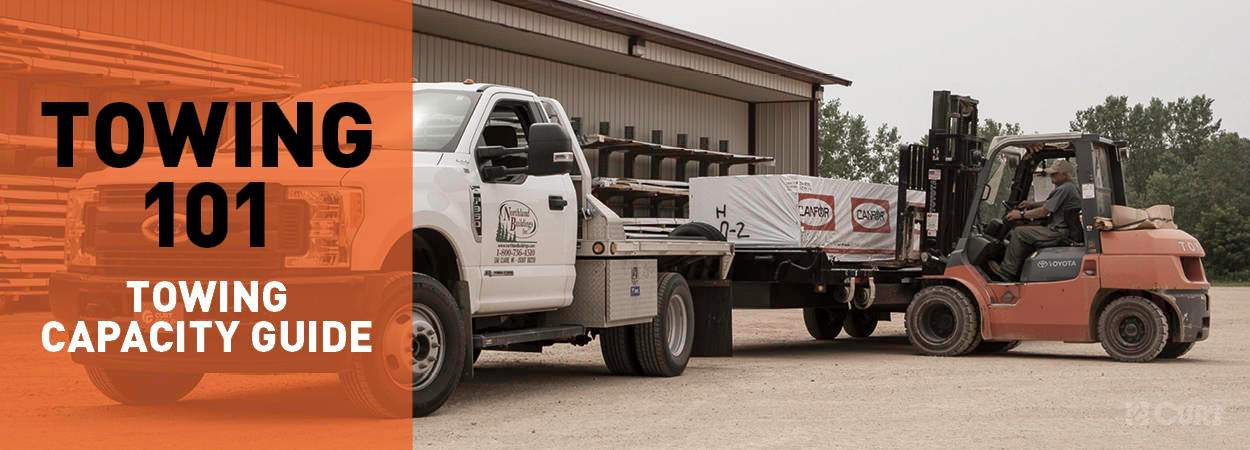
What Is Towing Capacity?
Towing capacity is the maximum amount of weight your vehicle can tow when pulling a trailer. It is determined by the vehicle manufacturer and takes into account the GVWR, GAWR, GTW and more.
What does towing capacity mean? Very simply, it is how heavy your trailer can be.
Max towing capacity should always be observed in any towing situation. Exceeding this capacity -- or towing more weight than your vehicle is rated for -- is extremely dangerous. Be smart and know your vehicle's limits!
Vehicle Towing Capacity Chart
Tap to read more!

How to Calculate Towing Capacity
To determine maximum towing capacity, you will need to know the vehicle manufacturer's weight ratings and compare them against the gross weight of your trailer. Most vehicles have the trailer towing capacity listed in the owner's manual, on the driver-side door jamb or in a trailer towing capacity guide on their website.
How to determine towing capacity: whether you're looking up SUV towing capacity, pickup truck towing capacity or car towing capacity, consult the vehicle manufacturer!
If the vehicle's ratings are higher than the total weight of the trailer, the trailer is safe to tow. If the trailer weight exceeds the vehicle's ratings, the trailer should not be hitched up to the vehicle.

How Much Can My Vehicle Tow?
Towing Capacity Examples
What is GVWR?

GVWR stands for Gross Vehicle Weight Rating
What does GVWR mean? It is the maximum loaded weight of your vehicle (or trailer), as determined by the manufacturer. GVWR isn't just the weight of passengers and cargo but also the vehicle itself.
The gross vehicle weight rating is all about safety. When a vehicle manufacturer rates a vehicle for its maximum weight, they are taking into consideration the suspension system, frame, axles, wheels and other components bearing the load.
GVWR vs Towing Capacity
GVWR is the maximum weight capacity of a vehicle without a trailer attached. Towing capacity, on the other hand, is the maximum weight capacity of the vehicle, specifically in terms of how heavy of a trailer it can tow.

What Is GVWR on a Trailer?
GVWR explained: gross vehicle weight rating (GVWR) refers to the maximum allowable weight of any given vehicle. A vehicle may be an automotive vehicle or a trailer.
In the case of a trailer, the GVWR is the most a trailer can weigh in total, as determined by the trailer manufacturer.
What is the average weight of a trailer?
What is GCWR?

GCWR stands for Gross Combined Weight Rating
What does GCWR mean? It is the maximum weight of your vehicle with a trailer attached, as determined by the vehicle manufacturer. Combined weight means the weight of both the tow vehicle and the trailer together. It also includes any cargo or load placed in either vehicle.
The rating for gross combined weight or gross combination weight is determined for the vehicle based on the strength of its frame, suspension, axles and other towing-related components.
GVWR vs GCWR
GVWR refers to weight capacity of the vehicle alone. GCWR, however, is a weight rating of the vehicle but takes a hitched up trailer into account. It is the maximum weight of a vehicle with a trailer attached.
What is GAWR?

GAWR stands for Gross Axle Weight Rating
GAWR is the maximum weight that can be placed on the vehicle's front or rear axles. The vehicle manufacturer gives each axle its own rating. FR is the front rating, and RR is the rear rating.
The gross axle weight rating accounts for passengers and cargo, as well as the possibility of a trailer in tow. Exceeding the GAWR can be detrimental to the vehicle's axles.
What is GTW?

GTW stands for Gross Trailer Weight
What does GTW mean? It is the total weight of the trailer and its cargo. It can be determined by putting the fully loaded trailer on a vehicle scale or using a trailer weight scale.
Unlike GVWR, GCWR and others, gross trailer weight is not a prescribed rating, but a descriptive measurement. A trailer may have a weight rating designated by the manufacturer. This is the GVWR. GTW, on the other hand, is the actual weight of the trailer, independent of its given rating.
The GTW should never exceed the GVWR.
Trailer Weight vs Towing Capacity
Gross trailer weight is the total calculated weight of a trailer and its cargo. GTW isn't so much a rating as it is a measurement. Towing capacity, on the other hand, is the maximum allowable weight a vehicle can tow as determined by the manufacturer.
Learn more about trailer weight
What is TW?

TW stands for tongue weight
TW is the downward force exerted on the back of a tow vehicle by a trailer or towable load. It is greatly affected by where cargo is positioned in a trailer and is important for maintaining good control of the vehicle.
What is Curb Weight?

Curb weight is total vehicle weight
Curb weight is the total weight of your vehicle apart from any passengers, cargo or non-factory items. Curb weight does include the weight of gasoline, oil and other fluids necessary for operation.
You can think of curb weight as the weight of your vehicle, as it sits parked at the dealership.
Curb Weight vs GVWR
Curb weight is a measurement of the vehicle’s total weight -- that is, without any passengers or cargo -- while GVWR is a weight limit prescribed by the vehicle manufacturer.
What is Dry Weight?

Dry weight is vehicle weight without fluids
Dry weight is the total weight of your vehicle without passengers, cargo or fluids. Dry weight is similar to curb weight, except dry weight does not include the weight of automotive fluids needed for operation.
Dry Weight vs GVWR
Dry weight is a measurement of the vehicle's total weight without any of the fluids needed for operation. In contrast, GVWR is a weight limit prescribed by the vehicle manufacturer that dictates how heavy the vehicle can safely be.
What is Payload Capacity?

Payload is the weight of your cargo
Payload capacity is the maximum amount of weight a truck or other vehicle can haul, in terms of cargo and passengers, specifically in the truck cab, truck bed or cargo area.
The payload is the actual cargo itself in the truck bed. The payload capacity is how much cargo the truck can haul in terms of weight. It is important to note that the payload weight includes the tongue weight of the trailer if a trailer is hooked up.
Payload vs Towing Capacity
Both payload and towing capacity are maximum weight limitations determined by a vehicle manufacturer. Payload, however, is the weight limit of a truck bed and cab, while tow capacity is the weight limit for a trailer hitched up to the vehicle.
Never exceed the weight capacity of the lowest-rated component of your towing system. For example, your trailer hitch may be rated to tow 5,000 pounds, but your vehicle may only be rated at 3,500 pounds.

Can I Tow a Trailer with My Car?
Yes, many cars can tow a trailer, as long as they have the right towing equipment and tow rating. Automobile towing capacities are rated by the manufacturer. Full-size sedans and other larger cars are often rated for some level of towing, while compact and sub-compact cars may not be.
To learn if your car can tow a trailer, refer to the owner's manual. Whether your car is rated to tow a trailer or not, CURT likely offers a custom receiver hitch for your make and model, even if it is only used for attaching a bike rack or cargo carrier.

How to Increase Towing Capacity
Increasing towing capacity can be accomplished with a variety of accessories, but it is important to always abide by the lowest-rated towing component.
The best way to increase tow capacity is to purchase towing accessories that match your vehicle's existing ratings. In other words, don't limit your potential with a low-rated hitch or ball mount. Additionally, you may consider a weight distribution hitch as a means of optimizing capacity.
Towing Capacity FAQs
Is the GVWR the actual weight of a vehicle?
No, the GVWR is not necessarily the actual weight of a vehicle. The GVWR (Gross Vehicle Weight Rating) is a prescribed weight limit from the vehicle manufacturer, indicating the total amount the vehicle can weigh to operate safely.
The actual weight of the vehicle should never be above the GVWR. Actual weight should always be less.
What happens if you exceed GVWR?
Exceeding the gross vehicle weight rating (GVWR) of any vehicle may cause serious damage to the vehicle’s frame, suspension, axles, wheels and other systems. The GVWR is intended to be a maximum weight limit to protect the life of your vehicle.
Attempting to drive with an overloaded vehicle is a serious safety hazard to the driver, passengers and other vehicles on the road.
Is curb weight the same as empty weight?
Yes, curb weight is another name for empty weight. Curb weight is the weight of the vehicle in its factory condition. It excludes any cargo, passengers or aftermarket accessories.
Curb weight is the weight of a vehicle, parked in the lot of a dealership.
Does curb weight include driver?
No, curb weight does not include the driver. Curb weight is simply the weight of the vehicle in its original condition from the factory. It does not include the driver or any passengers or cargo.
How do I calculate curb weight?
Curb weight is calculated by weighing the vehicle in its factory condition. This requires the removal of all passengers, cargo and aftermarket equipment. Curb weight does include fluids necessary for operation, such as gasoline and oil.
With the passengers and cargo removed, weight the vehicle using a vehicle scale. This will give you the curb weight.
Where can I find the weight of my vehicle?
You can find the weight of your vehicle by measuring it with a vehicle scale. A vehicle scale will provide the actual, real-time weight of your vehicle.
For the gross vehicle weight rating (GVWR) provided by the manufacturer, this information can typically be found on the driver-side door sill, in the owner’s manual or on the manufacturer website.
Ready to find a hitch? Start by looking up your vehicle!
Towing 101 Table of Contents
Looking for more.
Discover more great tips and how-tos on the Lippert blog -- your destination for all things RVing, towing, boating and beyond!
LetsTowThat.com
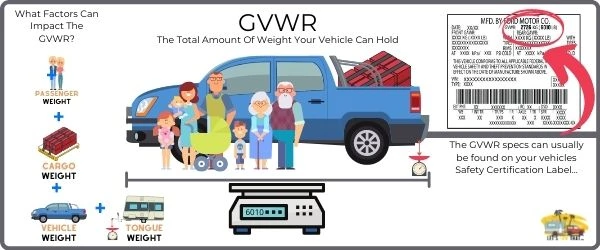
What Is GVWR? Everything You Need To Know
All vehicles have something in common and it doesn't matter if you are driving a two-door car, a full ton pickup or anything in between – you need to know your gross vehicle weight rating, since exceeding this weight limit means overloading your vehicle and could cause major damage to your vehicle, yourself or others.
What Is GVWR, Anyways?
GVWR stands for Gross Vehicle Weight Rating, and it refers to the maximum amount of weight that your vehicle can safely carry, including its own weight, all of the people riding in the vehicle and all cargo that you will be carrying.
The GVWR of your vehicle is a very important specification that you need to know, especially if you plan on carrying a significant amount of passengers, cargo or both!

You should never load your vehicle beyond its gross vehicle weight rating since doing so will cause a number of potentially serious issues for your vehicle and even for the other drivers on the road.
What Does The GVWR Include?
To be specific, the GVWR usually includes the curb weight of your vehicle, all fluids topped off (oil, coolant, transmission fluid, fuel, etc.), the tongue weight of the trailer (if you have one attached), all passengers and cargo that will be riding in the vehicle and any sort of accessories or extra components that have been installed from the factory.
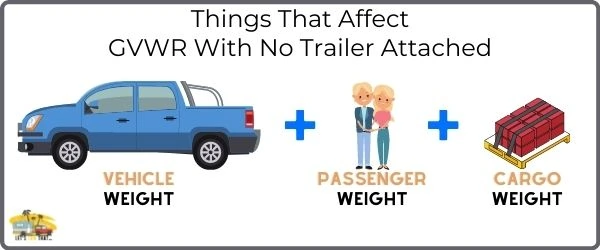
Note: Any equipment or modifications you add to the vehicle itself is not calculated in the GVWR specs and you will have to deduct the weight of everything you added from the GVWR specified.
A Real Life Example Of How To Use The GVWR Spec...
As an example, the 2021 Honda Ridgeline has a GVWR of 6,019 pounds – easily more than what you can imagine would fit inside it's cab, but if you were planning on hauling concrete, rocks, sand or something else that is very heavy, then you could potentially run the risk of exceeding your GVWR.
If we take that same vehicle and do a little bit of calculating, we can see what amount of weight we have left after we deduct the vehicle's weight. Let's take the GVWR of 6,019 lbs. and deduct the curb weight of the vehicle, which is 4,510 lbs. for this model. That gives us a difference of 1,509 pounds and that is how much additional weight we can haul.
(GVWR) 6,019 lbs. - 4,510 lbs. (CURB WEIGHT)= 1,509 lbs. (AVAILABLE WEIGHT)
If we have the driver of the vehicle and 3 additional passengers and they all weigh 200 lbs., then we would have to deduct that 800 lbs. from the 1,509 lb. available capacity, which would leave us with 709 lbs. of weight still available.
1,509 lbs. (WEIGHT CAPACITY AVAILABLE) - 800 lbs. (DRIVER AND PASSENGER WEIGHT) = 709 lbs.
If we wanted to go and pick up bags of concrete from the hardware store that weigh 100 lbs. each, then we only have enough capacity to load 7 bags, leaving us with 9 pounds of capacity left.
709 lbs. (WEIGHT CAPACITY AVAILABLE) - 700 lbs. (CONCRETE WEIGHT) = 9 lbs.
This is an extreme example and you really don't want to come this close to your max. GVWR spec because other systems of the vehicle will become more vulnerable too, like cooling, brakes, etc.
Curb Weight:
The curb weight is how much the vehicle weighs without any driver, passenger, cargo or trailer weight. This is just the weight of the vehicle itself with all fluids topped off, ready to drive.
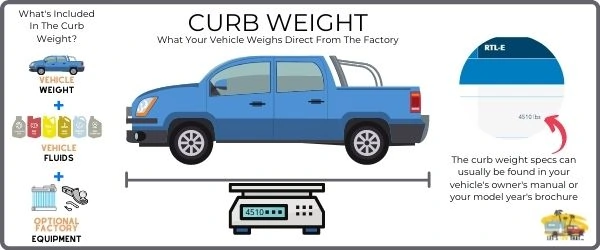
How The GVWR Relates To Towing...
You may have a vehicle that you plan to use for pulling trailers. One thing you need to note is that the gross vehicle weight rating is only slightly affected by towing, since the GVWR is just the weight of everything carried by the vehicle itself, and it does not take into account the weight of the trailer at all.
Even though the GVWR is not related to the towing capacity of your vehicle, the tongue weight of your trailer is still a factor that you need to factor into your GVWR.
Trailers have a tongue weight, which is a portion of its mass that the trailer coupler imparts on to the tow hitch receiver of the tow vehicle, and is in turn mostly borne by the rear axle.
In a properly balanced trailer, the tongue weight is somewhere around 10 to 15 percent of the trailer weight. This weight also takes up some payload capacity of your vehicle as well.
For example, a 2,000 pound trailer may have a tongue weight of 200 pounds that the hitch receiver of your vehicle needs to carry. That’s 200 pounds less capacity for the rest of your passengers and cargo, so if you have a truck that has a payload capacity of 2,000 pounds, then you only have an allowance of 1,800 pounds left for the rest of the stuff that you want to load into your vehicle, if you are to stay below the GVWR.
What Can Happen If You Exceed The Suggested GVWR?
Exceeding the gross vehicle weight rating of your vehicle means you are now driving an overloaded vehicle, and it’s a situation that can result in a lot of issues for you and your vehicle, for a variety of different reasons.
Here is an image of a very extreme case but the weight actually bent the bed of the truck, and possibly the frame too.

Exceeding The GVWR Example
Braking: The first and probably most important, is the way overloading affects the ability of your vehicle to stop. A vehicle that is too heavy will have a significantly longer stopping distance, since the brakes may not have the capability to quickly bring it to a stop, in its overloaded state. As you can imagine, this can result in a situation where you can lose control of your vehicle.
Steering: The steering issues that can result from exceeding the gross vehicle weight rating of your car or truck. Steering and handling are affected by several components of your vehicle – it’s steering components, suspension, axles, wheels, and other parts.
Suspension: Suspension components, in particular, can become ineffective if the vehicle is overloaded. They do a worse job of dampening the shocks on the road, and the handling of your vehicle suffers. Your suspension components can even possibly break down under the added load as well.
Tires: Tires are more like to blow out under the additional pressure and heat generated by supporting an overloaded vehicle, worn-out ones in particular.
How Do I Find the GVWR of My Vehicle?
There are several ways for you to find information on the gross vehicle weight rating of your car or truck. Since the GVWR is a specification that the car manufacturer has already determined for the particular make and model of your vehicle, it’s a number that will not change for the most part – once you find the GVWR of your vehicle, then all you need to do is to jot it down for your records.
The only time that you may need to reconsider the GVWR of your vehicle is if it has undergone some sort of upgrade or downgrade that affects its capabilities.
An older vehicle, or one that has developed issues with some of its components, may have a lower payload capacity than what the GVWR originally indicates, as well.
The quickest way to locate the gross vehicle weight rating of your vehicle is by checking the certification/safety label on the door pillar of your vehicle. This information label is usually located on the driver’s side of your vehicle, and it also includes other important metrics, such as the GAWR, VIN and tire air pressure and size specs for your particular vehicle as well.
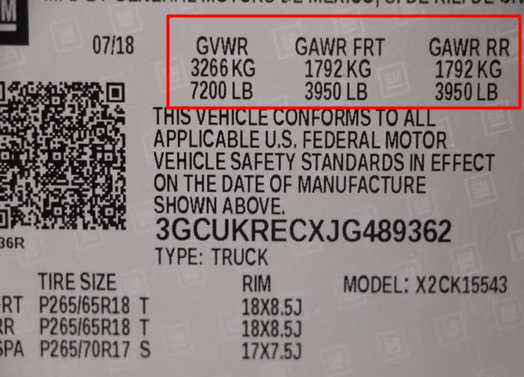
Chevy Certification Label
One of the best ways to find information on the GVWR of your car or truck is by consulting your owner’s manual. It will usually have the location of the certification label and sometimes even state the GVWR specs, along with other helpful weight ratings like GCWR, GAWR, etc.
GVWR on a Trailer
Your vehicle has a gross vehicle weight rating, but if you are a tow driver, then chances are you already know that your trailers also have their own GVWR as well. Just like the GVWR for your vehicle, the gross vehicle weight rating of your trailer includes its own weight, as well as all the accessories needed to tow it safely.
Unlike the GVWR of cars and trucks, the GVWR for trailers has a wider variety of definitions depending on the manufacturer, as well as the region that the trailer was built in. Some trailer makers specify a GVWR based on the lowest component rating on their product. Others determine a GVWR per trailer axle – for example, a trailer with two axles may have a GVWR per axle rating of 6,000 pounds, for a total of 12,000 pounds GVWR.
If you are planning to tow a commercial grade trailer, you will also have to factor in a few other things aside from the weight of your payload. You may have to take into account your pallet fork holders, parking jacks, winches, grapple buckets and other things that you need to haul commercial grade cargo.
What is the difference between GVWR and GVW?
The difference between the gross vehicle weight rating (GVWR) and the gross vehicle weight (GVW) of your vehicle is that the GVWR is a specification, and the GVW is an actual measurable quantity.
The GVWR is the manufacturer’s maximum rated weight that it recommends for your particular vehicle, including its own weight and the load that it carries. The GVW, on the other hand, is the actual weight of your car and truck with passengers, luggage and payload in it.
Finding These Numbers...
The GVWR is clearly posted (usually on the certification label) and usually is a static metric, like we talked about. It is easy to find and can be located and recorded in a matter of seconds.
The GVW, on the other hand, is something that you will have to measure directly. One way to do it is by using a commercial scale designed for vehicles and measure the gross vehicle weight of your vehicle in its current state, as it is loaded with the passengers, cargo and additional accessories.
* Commercial scales can be found in many places like some truck stops, county waste management facilities, local law enforcement offices, etc.
GVW vs GVWR:
The GVW (gross vehicle weight) accounts for the curb weight of the vehicle and includes the weight of the passengers, cargo, aftermarket options you installed that contribute to the GVWR specs listed.
GVW is not a limit like the GVWR is, it is simply just the additional weight you are adding to the vehicle (plus the curb weight).
GVWR vs GCWR
The gross combined weight rating (GCWR) is another important rating you need to look up for your vehicle if you plan to tow a trailer. While the GVWR is the maximum weight capacity of the vehicle loaded with people, luggage and cargo, it’s a figure that does not usually take a trailer into account, except for the tongue weight of the trailer.
The gross combined weight rating or GCWR, on the other hand, does take into account the weight of a hitched up trailer. It includes the weight of the vehicle, the weight of passengers and cargo in it, and then combines it with the weight of the trailer itself.
The GCWR is also referred to as the gross combination mass (GCM), gross train weight (GTW) or maximum authorized mass (MAM).

GVWR vs GAWR
The Gross Axle Weight Rating or GAWR is the maximum weight that can be safely supported by an axle of your vehicle. Since your vehicle usually has two axles, most GAWR information is usually followed by the axle it is meant for. GAWR FR is the rating for the front axle, while the GAWR RR is the rating for the rear axle.
GVWR is a figure that looks at the overall capabilities of the vehicle. The GAWR, on the other hand, is more focused on the capabilities of the axles of your car or truck. You will usually see the GAWR listed alongside the GVWR in the owner’s manual, or in the certification label on the driver’s side door frame.
Example: If we take a pickup truck and use it as an example, we know that the front axle rating will have more of it's capacity taken up by the weight of the engine, which can weigh several hundred pounds, in some cases. The rear axle only has to support the weight of the sheet metal bed, which weighs a lot less, so more capacity will be available for the rear axle, if both axles have the same weight rating.
Last updated on May 10th, 2021 at 05:33 am
Want To Share This?

Breadcrumbs
Understand your trailer gvwr (gross vehicle weight rating).
John was on his way to the jobsite. He had just purchased a new skid-steer loader, and this was going to be his first job with the new equipment. The research he did online helped him determine that this particular model would allow him to finish a job 25 percent faster than his old model. This meant he could earn more money, which justified the purchase of the skid-steer loader and the new trailer. Little did he know that what he planned to save in efficiency, he spent on the Department of Transportation (DOT) ticket for being overweight on his gross vehicle weight rating (GVWR).
This is a common occurrence these days as more states are looking for revenue to subsidize their budgets. Gross Vehicle Weight Rating laws are not new—authorities have just been lax about enforcing them in the past. They are now enforcing the laws, not only for revenue but for safety reasons and to prevent wear-and-tear on the highways, which also saves taxpayer’s money.
John received his ticket because he did not understand GVWR, which is the case for many contractors. Even manufacturers have different interpretations of GVWR because the government leaves it up to each manufacturer to rate its trailers as they see fit. The bottom line: Whatever the tag on the trailer says for Gross Vehicle Weight Rating better be higher than what the scale reads.
John’s new skid loader with the attachment weighed 9,700 pounds, so he thought his trailer, with a 9,990-pound GVWR, was sufficient. However, he did not consider the trailer’s weight (or any attachments on his skid loader). Even though his state recognizes tongue transfer, the most he could transfer to his tow vehicle was 1,200 pounds. With the trailer weighing in at 2,600 pounds, his total weight was 11,100. He was over by 1,110 pounds.
John cannot be blamed 100 percent because his dealer should have explained GVWR and asked John some pertinent questions about his tow vehicle. The dealer also should have known the weight of the skid-steer loader and attachment.
What is Trailer GVWR?
Trailer GVWR (Gross Vehicle Weight Rating) is the amount of weight the vehicle can carry. Some manufacturers rate the GVWR at the lowest component rating, while others include the trailer’s weight on top of the trailer capacity. If you have a trailer that weighs 2,600 pounds, that weight must be included in the capacity formula to stay under the GVWR. You also must consider the addition of accessories, such as pallet fork holders, a heavier parking jack, winch and battery and other items. Plus, you have to add the weight of any attachments you haul along with your skid loader. Even adding a planer or grapple bucket can put you over the limit.
Manufacturers have leeway in determining the GVWR of their trailers. One method is by taking the lowest component rating and calling that the GVWR. In most cases, that would be the axle or tire rating. In other cases, that would be the hub and wheel rating. Either way, the GVWR is determined at the axle. With this method, if your axle rating is 6,000 pounds per axle, and you have two axles, your GVWR would be 12,000 pounds.
Other manufacturers take that rating and add the trailer’s weight into the GVWR. If the capacity is rated at 12,000 pounds (determined by the axle capacities), and the trailer weighs 2,600 pounds, they would rate their trailer at 14,600 GVWR.
In the first case, the capacity rating of that trailer is determined by subtracting the weight of the trailer from the GVWR of 12,000 pounds. If the trailer weighs 2,600 pounds, then the payload capacity of that model is 9,400 pounds.
In the second case, the trailer’s weight is already in the GVWR, so the payload capacity of that trailer is 12,000 pounds. This sounds simple enough, but it actually is not. While the GVWR is rated at 14,600 pounds, the GAWR or Gross Axle Weight Rating is still only 12,000 pounds and you cannot exceed that capacity rating. In this case, you still have to include the 2,600-pound trailer weight. That weight must be transferred to the tow vehicle, but that transfer is also limited by the hitch capacity. If the hitch is only rated at 1,200 pounds, you cannot transfer the entire weight of the trailer to the tow vehicle. This reduces your payload capacity by the difference of 1,400 pounds, so the actual capacity would be 10,600 pounds. This is still higher than the 9,400 pounds in the first example but can throw you off when you are calculating the payload capacity.
This can be confusing to both dealers and consumers and, quite frankly, to DOT officers and even some state legislators. Like any law, it is open to interpretation. The best thing to do is first check your state’s DOT laws to see how the GVWR and capacity ratings are interpreted, and also check the CDL requirements. Next, determine the weight of everything you plan to haul on a trailer—equipment plus attachments, accessories and options. Then, look for a trailer with a GVWR higher than the weight of everything you will be hauling. If your state recognizes weight transfer to the tow vehicle, you can take that into consideration, but if your state does not, then make sure the trailer you purchase or use has enough GVWR or, in some cases, GAWR to haul your equipment.
Crunching Numbers
Use these formulas to determine your GAWR and GVWR:
GAWR = sum of all tire capacities, or the sum of all axle capacities
This formula is considered the GVWR on some manufacturer’s trailers. But other manufactures might use this formula for GVWR:
GVWR = Trailer Capacity + Trailer Weight
Payload capacity is then determined by one of these two formulas:
Gross Vehicle Weight Rating – Trailer Weight = Payload Capacity
Gross Vehicle Weight Rating – Trailer Weight + Tongue Transfer = Payload Capacity
Determining payload capacity and GVWR is not an easy task. You will need to determine what works in your region, and if required, you will simply need to purchase a trailer with enough Gross Vehicle Weight Rating to haul your equipment and follow the CDL requirements, or hire someone to haul your equipment for you. Construction Businesss Owner , February 2011
Shane Zeppelin is the marketing manager for Towmaster, Inc. He has been with the company for more than 15 years. Towmaster manufactures equipment trailers for the construction and rental markets in capacities ranging from 3,500 pounds to 120,000 pounds. For more information, visit towmaster.com.
Related Articles
- From Our Partners

View our digital edition here.
- Browse by Issue
- Digital Edition
- Products and Services Directory
- Online Exclusive
- Ask the Experts
- Trade Show and Event Coverage
- Latest Blog Posts
- Popular Now
- Customer Service
- Data Privacy
- CONEXPO-CON/AGG Video Product Showcase 2023
- World of Concrete Video Product Showcase 2022
- CONEXPO-CON/AGG Video Product Showcase 2020
What Is GVWR On A Trailer: GVWR Meaning for Trailer & Cargo
Commonly, we get to hear a lot about GVWR. First and foremost, we have to know what is GVWR on a trailer ? Particularly, GVWR is an abbreviation of Gross Vehicle Weight Rating. Alongside, GVWR is not just the weight of trailers and vehicles. This phenomenon does carry more specific information as well.
If you have a trailer or an unpowered vehicle, it is important to know about Gross Vehicle Weight Rating. Or else, you can’t figure those uncertain terms which appear relating to your trailer’s weight.

To make yourself affiliated with GVWR, look at the article below.
Table of Contents
GAWR Meaning
Axles of vehicles support distributed Weight like Gross Axle Weight Rating. Generally, GAWR includes FR and RR. Here, FR means front axles, and RR means rear axles.
However, GAWR refers to the maximum weight we usually place on our vehicles’ rear or front vehicles. In other words, FR and RR or GAWR indicate front rating and rear rating.
GVWR Calculator
Let us give a short look at how a GVWR calculator will look like.
For instance, you are going to measure the GVWR of your truck. There will be some requirements like- curb weight, GVWR, GCVWR, payload, towing capacity. You need to fill in all those points after knowing all that information from the manufacturer.
Then, there will be a part of the estimated payload. Those points are- passenger weight, cargo weight, and total payload by summing two points.
Next, you will see a towable RV, which includes UVW, GVWR, and hitch weight. There will be a hitched total after getting the above points done, which says available payload, new GVW, new GCVW, and towing capacity. That’s all in a GVWR calculator.
Find out more: Types of Trailer Hitches and Hitch Classes and What is the hitch and what is the receiver ?
How to calculate GVWR of truck and trailer?
Typically, GVWR or Gross Vehicle Weight Rating specifies the maximum total weight that any truck or vehicle can handle. Furthermore, many manufacturers determine that GVWR be listed in the owner’s manual.
While calculating the GVWR of a truck, subtract the weight of that truck’s curb from GVWR. Afterward, you will get the payload capacity of your truck.
Gross Vehicle Weight Lookup
In brief, GVWR is considered as the total allowed weight of a vehicle. With this in mind, you have to locate your vehicle’s Gross Vehicle Weight Rating on the driver’s side, where there is a door pillar.
Then add your vehicle’s curb weight with the combined weight of driver, cargo, and passengers.
Finally, a result will come, which is the gross vehicle weight of your truck or others.
Difference between GAWR and GVWR
The most distributed weight, an axle of a vehicle, can support is Gross Axle Weight Rating. In general, GAWR includes FR as front axles and RR and rear axles. Besides, all manufacturers say that GAWR conveys the term of maximum weight of rated handles. Check more details on GAWR Vs. GVWR
Contrastingly, GVWR or Gross Vehicle Weight Rating tends to be the most allowed weight of any cargo and trailer. Furthermore, GVWR specifies a vehicle’s maximum weight capacity.
Well, GAWR is always less than GVWR of any vehicle. In some cases, the axles of vehicles become overloaded. But if you measure such overloaded trucks, they will still be less than their GVWR.
4 Best Trailer Tongue Weight Scale Review & Buying Guide in 2023
Changing GVWR on trailer
To begin with an unpowered vehicle like a trailer, we need first to take the recommendations of the trailer’s GVWR from its manufacturer. After we get that certified rating from our coachbuilder, there is no way to change or replace the GVWR of any trailer.
By and large, trailers do have their curb weight which includes permanent parts of inside vehicles also. And this curb weight will always remain the same. Neither will it increase or decrease.
Coming to gross vehicle weight rating, it can surely decrease but never increase. All trailers have a specific GVWR. How much their manufacturers tell load, passengers, or cargo they can carry.
Sometimes, trailers face unwanted setbacks and thus get lessened in GVWR. But there is no scope to increase GVWR for sure.
Curb Weight Vs Gross Weight
Particularly, curb weight defines a vehicle’s weight when there is no cargo, passengers, or other items. However, curb weight also means the weight of a vehicle which includes all standard equipment that comes with the vehicle. In other words, curb weight is a similar version of a vehicle’s weight being on a flat surface.

Comparatively, gross weight denotes the weights of vehicles, including their packaging and goods carried inside.
Anyways, the Gross weight of a vehicle excludes all types of tare weights that we get to see in a transport unit. In addition, the Gross weight of a vehicle includes used packaged and actual products with vehicles.
What does 7,000 GVWR mean on a trailer
As mentioned before, GVWR implies Gross Vehicle Weight Rating. In essence, GVWR shows the maximum value of a vehicle’s weight. Other than that, this weight rating comprises all payloads that vehicles usually have.
Well, an example can make us more relatable to the concept. Suppose your truck weighs 5,500 pounds without having any extra materials inside and is empty. Or you can also call it the curb weight of your truck.
And if there are more items inside, such as multiple products and tools, then your truck can weigh more like 7000 pounds. Your truck’s total weight of 7000 pounds is known as the Gross Vehicle Weight Rating or GVWR.
Gross Vehicle Weight rating
The maximum and total safe weight of any vehicle are named as Gross Vehicle Weight Rating. Besides, when a vehicle is empty and does not contain any extra materials, it holds a curb weight. Afterward, when making your vehicle filled with supplement products and other tools, it will weigh more than before.
For instance, different accessories, fuel passengers inside the vehicle also spell a gross vehicle weight. And you can call that whole Weight GVWR.
Again, there is a tongue weight in every tow trailer, 10 to 20 percent of all trailer weights and tow loads. This type of extra load, together with vehicles, combines a gross vehicle weight rating.
What is GVWR on a Travel Trailer?
An unpowered vehicle like a trailer gains curbs weight when they are wholly empty from inside. But that does not mean the curb weight excludes inside permanent components as well.
Well, counting all inside particles with which trailers come also simulates the curb weight. Different from this curb weight, there is also a gross vehicle weight rating. Markedly, gross weight defines the allowable weight that a trailer can carry plus its actual curb weight.
In the case of most trailers, manufacturers themselves recommend a GVWR of the trailer. So, we can also judge based on that.
What is GVWR/PNBV on a trailer?
When a trailer is fully loaded, it acquires more heaviness. And that total mass of load and trailer is GVWR of that trailer. In other words, it is known as Gross Vehicle Weight Rating. Accumulating all subjects like passengers, fluids, and cargo trailers often gain more weight. This ultimatum weight which the trailer allows, plus its weight, is called gross vehicle weight.
When trailers are sold and registered, they grant registration forms and data plates. By adding all these formalities, Trailers are conveyed in two languages, i.e., PNBV and GVWR. Here, PNBV is equivalent to GVWR but in a French dialect.
What is GVWR on a horse trailer?
Usually, trailer manufacturers assign a value of GVWR, which refers to the weight of a trailer and its additional payloads. Also, GVWR is another name for the maximum loaded weight of a horse trailer. Besides, this gross weight rating includes carried gear, horses, and everything else inside trailers.
Similarly, like any other vehicle, horse trailers also exactly gain GVWR. Whenever a trailer is loaded with lots of equipment, such as products to sell, cargos, drivers, passengers, etc., it holds an additional weight, named GVWR.
What is GVWR rating on a trailer?
Since I already stated about GVWR, we know it indicates Gross Vehicle Weight Rating. There is always a maximum load capacity in every trailer. And we cannot exceed that limitation by putting more loads inside them.
When a trailer is in its condition with a curb weight, it gains no extra baggage inside. Contrastingly, when there are still heavy loads inside but with an allowable weight, the trailer seems heavier than earlier. Later on, the extra weight you will be getting from your trailer is its GVWR (Gross Vehicle Weight Rating).
What is GVWR and GAWR on a trailer?
Cargos and trailers in conjunction approach an additional weight. While that trailer being alone with no loads attains a curb weight only. And if there are added items inside trailers, they will have more mass which is called GVWR
Likewise, GAWR is a distributed weight that all axles of trailers and vehicles support. Aforenamed, GAWR (Gross Axle Weight Rating) includes FR and RR, which indicates front axle and rear axle.
Considering these two aspects, we can say that GVWR and GAWR are different from each other. Just like GVWR, GAWR represents the maximum weight of an axle.
What is GVWR on a boat trailer?
From the vision of Federal Law, a trailer display often conveys a GVWR (Gross Vehicle Weight Rating). Moreover, GVWR means the total weight of a trailer that contains gear, the water of eight pounds per gallon, the gasoline of six pounds per gallon, the engine, and of course, the boat.
Anyways, Gross Vehicle Weight Rating defines an allowable weight of both cargos and trailers. Also, on a boat trailer, the process exactly matches. One more thing is that there will be a GAWR posted on all trailer’s VIN labels.
What does GVWR mean on my trailer?
The greatest and complete safe load of any vehicle is named as Gross Vehicle Weight Rating. Also, when a vehicle is unfilled and doesn’t contain any additional materials, it holds a curb weight. After that, when you make your vehicle loaded up with supplement items and different apparatuses, it will weigh more than previously.
For example, various embellishments fuel travelers inside the vehicle additionally spell a gross vehicle weight. Furthermore, you can call that entire load GVWR.
Once more, there is a tongue weight in each tow trailer which is 10 to 20 percent of all trailer loads and tow loads. This kind of additional heaps, along with vehicles, consolidate a gross vehicle weight rating.
What does GVWR stand for on a trailer?
Since I previously expressed with regards to GVWR, we realize it demonstrates Gross Vehicle Weight Rating. There is consistently the greatest burden limit in each trailer. Furthermore, we can’t surpass that limit by putting more loads inside them.
At any rate, when a trailer is in its condition with a control weight, it acquires no additional things inside. Contrastingly, when there are still substantial loads inside yet with a suitable weight, the trailer is by all accounts more weighty than prior. Later on, the additional weight you will get from your trailer is its GVWR (Gross Vehicle Weight Rating).
Frequently Asked Questions
What does 7000 gvwr mean on a trailer.
Like I said before, GVWR or Gross Vehicle Weight Rating is another form of the total weight of a vehicle, including how much extra heaviness it can carry. For example, if a trailer weighs 5,500 pounds without any payloads, it would weigh 7000 pounds with additional loads. And this total weight of 7000 pounds is known as GVWR or Gross Vehicle Weight Rating.
Is the GVWR the actual weight of a trailer?
No, GVWR is not the actual weight of a trailer. In contrast, GVWR is not the only weight of cargo and passengers as well. Well, a gross vehicle weight rating completely represents the safety of a vehicle too. Summing up, we can say that GVWR covers the main weight and other weights of loads together.
How much weight can a 14000 GVWR trailer carry?
Anyone can haul a trailer when it is derated. For instance, your trailer has a GVWR of 14k, which derates into 9990#. Hence, it will be easy to haul it on any CA road. As a result, there would be a stickered payload capacity of 5990 lbs. And if your trailer is stickered, a CDL will be required. Therefore, you can tow your trailer at 14000 GVWR by having a payload capacity of 9990 pounds.
What does GVWR on a trailer mean?
Aforesaid, GVWR or Gross Vehicle Weight Rating signifies a trailer’s total safe weight in a maximum value. Besides, the GVWR of a trailer counts all weight of cargos, passengers, and accessories of that vehicle. And most importantly, a trailer’s curb weight is there in the Gross weight of a trailer.
Final Words
Conclusively, we got to know a lot about GVWR. Now I don’t think you will have any questions like, what is GVWR on a trailer. Let us not beat around a bush and have a summary again.
GVWR represents an allowable weight that a trailer can hold, including its weight. Every time you will be going to fill your trailer with multiple items, do not forget to check its GVWR first. Hopefully, you know how to calculate the Gross Vehicle Weight Rating of a trailer. Just apply the method, and you will always be certain about your trailer’s GVWR.
Related Articles

Smittybilt Winches Review: Smittybilt X20 or Smittybilt XRC20

5 Best Engo Winches Review BuyingGuide & FAQ in 2023

4 Best Tuff Stuff Winches Reviews & Buying Guide in 2023

Top 5 Champion Winch Reviews with Ultimate Buying Guide in 2023
About the author.
Dencan Brain
Leave a comment cancel reply.
Your email address will not be published. Required fields are marked *
Save my name, email, and website in this browser for the next time I comment.

- Nameplate Designer
- Panels & Faceplates
- Graphic Overlays
- Labels & Tags
- Architecture
- Heavy Equipment
- Industrial Engines & Pumps
- Manufacturing
- Marine & Shipbuilding
- Professional Audio Equipment
- Transportation & Logistics
- AlumaMark BlackPLUS
- Anodized Aluminum
- Stainless Steel
- Polycarbonate
- Flexible Magnetic
- Certifications
- ISO Certified
Trailer GVWR vs. GAWR: What’s the Difference?

Table of Contents
Overweight or overloaded trailers are a big problem on roads worldwide. Vehicles hauling too-heavy or improperly-loaded trailers are at a greater risk for loss of control down inclines, delayed braking issues, and tipping due to uneven weight. Fortunately, there exist strict mandates in the United States, (thanks to the guidelines laid out by the FMCSA ) that are designed to help guarantee that weight will never be an issue.
One of the ways in which this is possible is GVWR and GAWR. Though these acronyms sound similar and both concern weight safety, they are uniquely different. Let’s see why.
Definition of Trailer GVWR

GVWR, short for gross vehicle weight rating , is a unit that is used for a wide range of vehicles, starting from lightweight pick-up trucks, moving all the way up to the heaviest-duty tractor trailers allowed on roadways.
While GVWR is attributed to different classifications of vehicles (i.e., trucks vs. trailers), its main message is the same. In a nutshell, it gives two very vital pieces of information:
- the base curb weight of the vehicle (the trailer and/or vehicle when it includes all standard equipment )
2. the weight of all optional truck and/or trailer accessories (anything that does not come standard from the manufacturer).
The second facet of GVWR is an important one as these optional accessories can add on plenty of extra weight to the total load. It should also be noted that GVWR includes the weight of the operator, as well as any passengers.
There is a formula for calculating GVWR , which is useful once things like optional accessories and passengers come into play. It is as follows:
GVWR= Trailer Capacity + Trailer Weight
Broken down, trailer capacity is the maximum amount of weight that the trailer can hold, and the trailer weight is the combined weight of every item that is being hauled in the trailer.
Like various other trailer weight factors, the GVWR is likely to never change. The only reason this might occur is if a manufacturer issues a recall, or if there is a formal change made by an issuing authority, such as the U.S. Department of Transportation (DOT).
Definition of Trailer GAWR
GAWR, short for gross axle weight rating , is a unit that is applied to all kinds of vehicles, but specifically vehicles that have multiple axles, starting with a car, and moving all the way up to multi-axle trailers.
GAWR is a unit stipulated by the manufacturer of the trailer and/or vehicle that states the maximum amount of weight that can be placed on each of the axles. You can expect a gross axle weight rating to differ between front and rear axles, as different ends of the vehicle can handle different amounts of weight.
Similar to GVWR, the GAWR of a trailer will always remain the same unless the manufacturer issues a recall or an authority like DOT changes its guidelines.
If you are unsure of where to locate a trailer’s GAWR, check inside a door frame, where you will see the manufacturer’s placard. There, you will also find other pertinent weight information, like GVWR.
Differences Between GVWR and GAWR
The key differences between GVWR and GAWR mostly concern the way in which weight capacity is handled.
For instance, GVWR is used as a way to look at the trailer’s weight, as is and with only standard equipment. By removing all other variables, even the weight of passengers or a load, we get an idea of the trailer’s constraints. Added to that is the additional weight of all items and/or people that have been brought on.
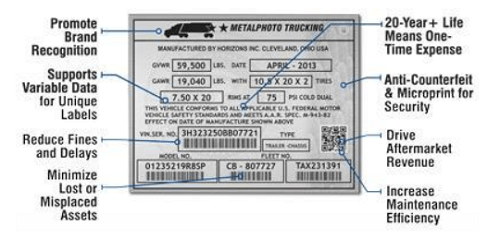
On the other hand, we have GAWR, which is used to measure the maximum amount of weight on each axle. As mentioned, the GAWR will vary on the same trailer depending upon the placement and/or the number of axles. GAWR is not to be confused with GAW, the gross axle weight , a number that is constantly changing based on how much weight is added and taken away from the trailer. The GAW must always be lower than or equal to the GAWR, so it’s important to have the vehicle’s GAWR displayed with other data on the vehicle’s data plate . To aid compliance, choose data plates constructed of a durable material such as Metalphoto® to ensure that the GAWR, GVWR, and other important data remains legible throughout the vehicle’s lifespan .
While both GVWR and GAWR are used to measure weight on trailers and other vehicles, they are unique in what they measure. GVWR can be considered more as a big-picture unit system that is designed to look at a trailer’s weight overall. Conversely, GAWR only concerns the maximum weight as it relates to the trailer’s axles , and nothing else.
Both GVWR and GAWR are incredibly important, unchanging numbers that every operator and fleet manager should know. To get a more in-depth look at GVWR and GAWR, as well as the guidelines that are attached to them, consult FMCSA’s manual .
Questions about the article? Let us help!
Our sales engineers are experts in automatic asset tracking, tagging and identification,a nd can answer all your questions. Get in touch now.
You May Also Enjoy...
The articles here will be one category that is also tagged in this article so that users get articles similar to their interests. Blog Home ›

The Ultimate Guide to Product Identifiers
All businesses rely on a range of products to fulfill their mission, but it isn’t always easy managing a swath of products across an enterprise. This is why businesses in …

25 Top Industrial Generator Manufacturers
Industrial generators keep your business running at remote sites or when your main power source fails. Regardless of the use case, industrial generators are necessary for keeping your business safe, …

The Manufacturer’s Guide to Metal Labeling
Every organization needs to identify, track, and manage the important assets that keep its operations running. Labeling or tagging these assets is a must to keep tabs on your most …
Create The Ideal Solution For Your Product Identification Needs

IMAGES
VIDEO
COMMENTS
GVWR means Gross Vehicle Weight Rating. This is the absolute maximum amount of weight that the trailer can bear when it is fully loaded. This includes all cargo, fluids, and passengers, plus the original weight of the trailer. This weight rating should not be exceeded. GVWR is very important to know when it comes to purchasing a travel trailer.
GVWR = Trailer Weight + Trailer Capacity. So, let's take it from the top and work out what each part of the formula means. The trailer capacity is the total combined weight of all of the items that you want to haul in the trailer. The other end of this is the trailer weight. This number is something you have no control over - it is the ...
GVWR means the maximum permissible weight of the RV, including the UVW plus all passengers, personal items, cargo, fluids, options and dealer-installed accessories. The GVWR is equal to or greater than the sum of the UVW and the GCCC. Unloaded Vehicle Weight. Sometimes referred to as "Dry Weight," UVW means the weight of an RV as built at ...
Dry Weight. Dry Weight is the actual weight of a vehicle or trailer containing standard equipment without fuel, fluids, cargo, passengers, or optional equipment.We have seen the following variations to this definition: Includes commonly ordered optional equipment. Includes fluids of generator and other onboard equipment (oil, coolant, fuel)
Gross vehicle weight, or GVW, refers to the total weight of the vehicle. It includes the vehicle itself, as well as the weight of the passengers and cargo. You can find this number by driving over a public scale, or by doing a little math. Start with the curb weight of your vehicle. Curb weight is the weight of the vehicle when equipped with ...
GVWR stands for Gross Vehicle Weight Rating. Essentially, it's the maximum weight (while loaded) at which a vehicle or trailer can safely operate. Your vehicle or trailer and the things inside it all count toward your GVWR, including your passengers, cargo, and even gas. GVWR is a very important number to know and not to exceed.
The GCWR is the maximum combined weight of a tow vehicle and any other vehicle it pulls. This applies to a truck towing a travel trailer or fifth wheel, as well as a motorhome pulling a dinghy. This rating is the absolute maximum weight of the tow and towed vehicles, including cargo, passengers, fluids, and other items that are onboard.
Terms like GVWR and GAWR often appear in trailer specifications, but what do they mean? In this comprehensive guide by Pro-Line® Trailers, we'll break down these terms and explain their importance in safe and legal towing. 1. What is GVWR? GVWR stands for Gross Vehicle Weight Rating. It is the maximum weight that a trailer can safely carry ...
The Gross Vehicle Weight is the actual weight of the fully loaded RV including all cargo, fluids, passengers, and optional equipment. ... But just because your RV is rated for 5,000 lbs of towing capacity that doesn't mean you can tow a 5,000 lb car. Since the GCWR includes the weight of all gear that goes along with towing, the weight of the ...
GVWR (Gross Vehicle Weight Rating): The maximum allowable weight of a fully loaded vehicle, including its own weight plus passengers, cargo, and any added equipment. GCWR (Gross Combined Weight Rating): The maximum allowable combined weight of the towing vehicle and the towed vehicle (or trailer) combined, including passengers, cargo, fuel, and ...
Take GVWR seriously when considering going past the amount your vehicle can hold. What Does GVWR Mean on a Trailer? GVWR on a trailer still stands for Gross Vehicle Weight Rating. A trailer is considered the vehicle in this case. The GVWR is the most a trailer can weigh in total including the cargo, as determined by the trailer manufacturer.
The GVWR meaning and towing capacity are two different calculations. Travel trailers and fifth wheels don't have a towing capacity because they don't tow anything behind them. Towables do have a GVWR, however, which is the total amount of cargo plus the weight of the empty camper. A truck, on the other hand, has both a GVWR and a towing ...
The Trailer's Payload Capacity is the total weight of the cargo you can add to the trailer safely. Payload capacity is also sometimes referred to as your cargo capacity. The Payload Capacity is usually stickered on the trailer near the VIN#. It can be found by Subtracting the Empty Weight of the trailer from the stickered GVWR.
Additionally, if you're towing a travel trailer behind an SUV, some of the weight of the trailer is transferred through the tongue or hitch and adds to the gross vehicle weight of the SUV. And in that same vein, if you're towing a toad behind a motorhome, the weight of the towed vehicle is transferred to the motorhome through the hitch weight.
To understand how your trailer is rated, you should know that it's like a three-legged stool—GVWR, GAWR, and tongue weight each represent a leg. 1. Gross Vehicle Weight Rating (GVWR) The Gross Vehicle Weight Rating (GVWR) is the absolute maximum that your fully-loaded trailer can weigh. It takes into account not only the trailer's dry ...
What Does GAWR Mean? The supporting axle has a rating for the amount of distributed weight it can handle. With campers and trailers, this is referred to as the Gross Axle Weight Rating (GAWR). This denotes the maximum weight for both the front (FR) and rear (RR) axle limits. This rating is usually different from the Gross Vehicle Weight Rating ...
As a rule of thumb, for travel trailers, we assume ranges of 10-15% tongue weight, and for 5th wheels, we usually assume 15-25%. So you'll rarely see a GVWR greater than 110% GAWR for a travel trailer or 115% GAWR for a 5th wheel. But again, if you're quick at math, you probably noticed that 449 lbs. isn't anywhere close to 15% of the ...
It can be determined by putting the fully loaded trailer on a vehicle scale or using a trailer weight scale. Unlike GVWR, GCWR and others, gross trailer weight is not a prescribed rating, but a descriptive measurement. A trailer may have a weight rating designated by the manufacturer. This is the GVWR. GTW, on the other hand, is the actual ...
Gross Vehicle Weight Rating (GVWR) is defined as the maximum allowed weight of the RV, including passengers, cargo, fluids, etc. As a reminder, the dry weight is the weight of the vehicle as it comes from the manufacturer WITHOUT such things as passengers, cargo, fluids, etc. You may see many other weight ratings on RV's/campers/trailers ...
GVWR is a figure that looks at the overall capabilities of the vehicle. The GAWR, on the other hand, is more focused on the capabilities of the axles of your car or truck. You will usually see the GAWR listed alongside the GVWR in the owner's manual, or in the certification label on the driver's side door frame.
While the GVWR is rated at 14,600 pounds, the GAWR or Gross Axle Weight Rating is still only 12,000 pounds and you cannot exceed that capacity rating. In this case, you still have to include the 2,600-pound trailer weight. That weight must be transferred to the tow vehicle, but that transfer is also limited by the hitch capacity.
Moreover, GVWR means the total weight of a trailer that contains gear, the water of eight pounds per gallon, the gasoline of six pounds per gallon, the engine, and of course, the boat. Anyways, Gross Vehicle Weight Rating defines an allowable weight of both cargos and trailers. Also, on a boat trailer, the process exactly matches.
Definition of Trailer GVWR. GVWR, short for gross vehicle weight rating, is a unit that is used for a wide range of vehicles, starting from lightweight pick-up trucks, moving all the way up to the heaviest-duty tractor trailers allowed on roadways. While GVWR is attributed to different classifications of vehicles (i.e., trucks vs. trailers ...
Federal Register/Vol. 89, No. 124/Thursday, June 27, 2024/Rules and Regulations 53505 1 87 FR 42339. 2 5 U.S.C. 553(e) requires that each agency provide interested persons the right to petition for the issuance, amendment, or repeal of a rule. 3 Docket No. NHTSA-2022-0053-0003, document titled ''Petition for Reconsideration of the